If you want to find valuable keywords, you need to use keyword research tools.
In this post, we’ll look at 18 paid and free keyword tools to help you perform effective keyword research.
Let’s start.
1. Keyword Magic Tool
Semrush’s Keyword Magic Tool is a powerful keyword research tool.
It has the largest keyword database on the market—over 24 billion keywords across 142 international databases.
Here’s how you can use it:
Open the tool, enter your seed keyword (a broad term related to your business), select your preferred database location, and click “Search.”

You’ll see thousands (or millions) of keyword ideas in seconds.
Here’s an example:
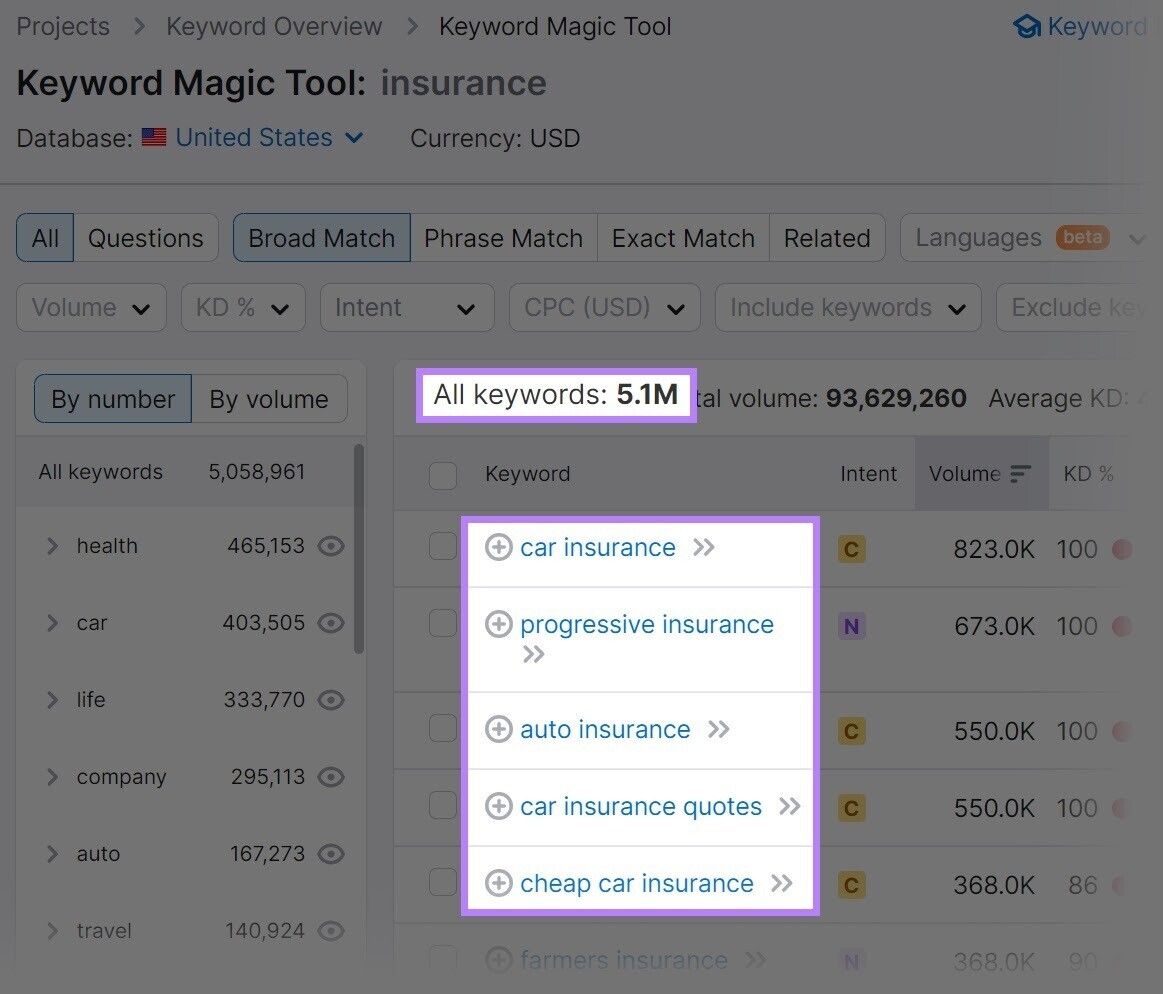
Want to narrow down your results?
No problem. You can apply the following (and more) filters:
- Questions: To see keyword ideas in the form of questions
- Broad Match, Phrase Match, Exact Match, and Related: To see different variations of your seed keyword
- Languages: To look for keywords in different languages
- Volume: To search for keywords that fall under specific search volume range, like 101-1000, 1001-10000, etc.
- KD %: To see keywords that have a specific keyword difficulty level for ranking, like “Easy,” “Hard,” “Very hard,” etc.
- Intent: To see keywords that reflect a specific search intent, like “Informational,” “Navigational,” “Commercial,” or “Transactional”
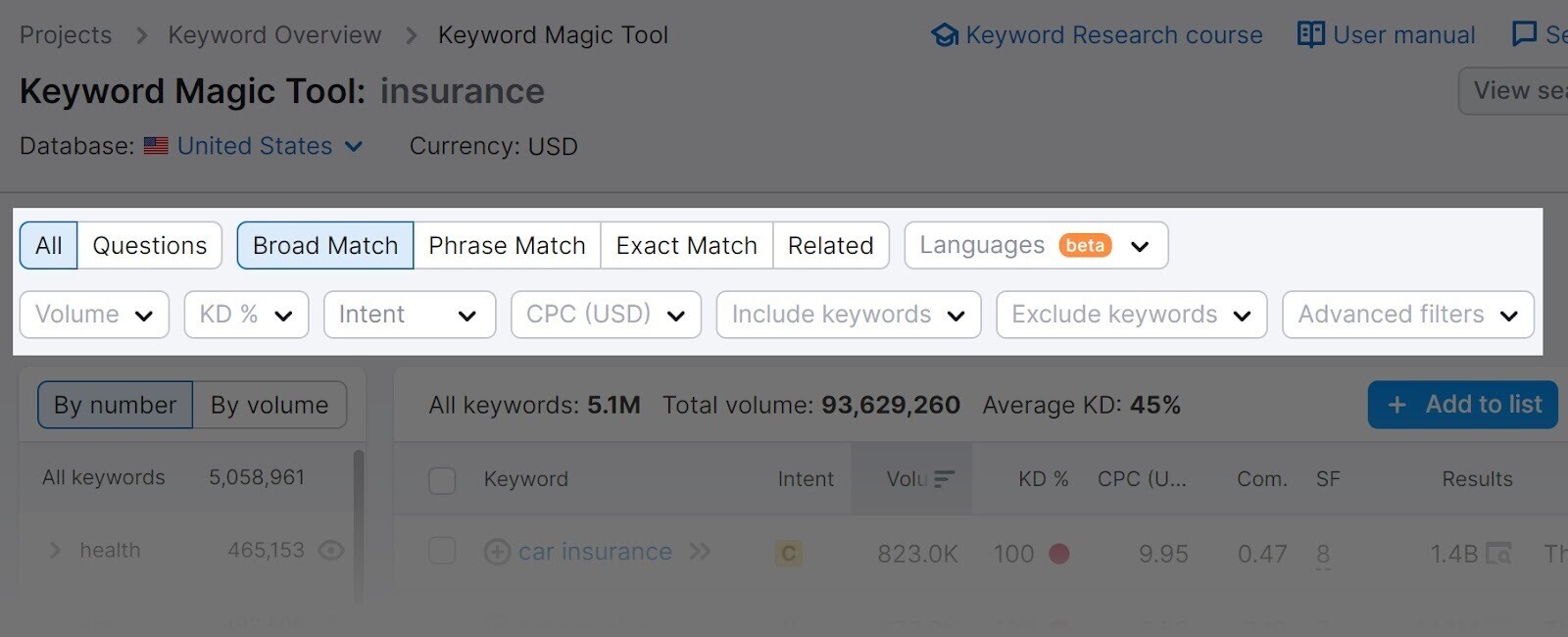
Select the filters you’re interested in, and your results will automatically narrow according to the new criteria.
Like this:
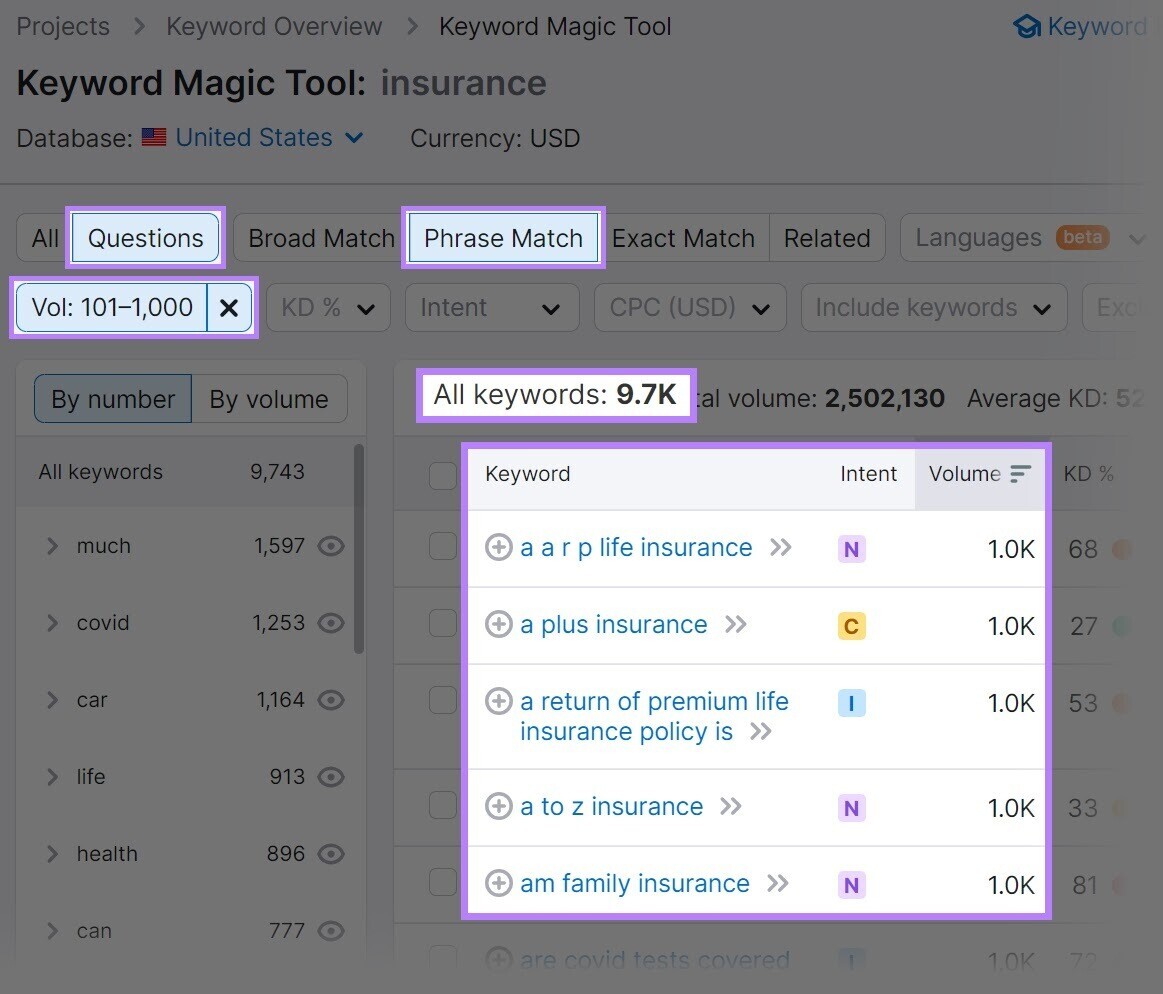
Pro tip: Read our detailed keyword research guide to learn how to find the best keywords with the Keyword Magic Tool.
Pricing: The Keyword Magic Tool is a part of Semrush’s SEO toolkit. You can sign up for free and perform 10 keyword searches per day. But the available data will be limited.
To use the Keyword Magic Tool to its fullest potential, subscribe to one of the paid plans.
The pricing starts at $108.33 per month paid annually or $129.95 per month paid monthly.
2. Keyword Overview
Keyword Overview is part of Semrush’s ecosystem of keyword research tools for SEO.
It provides a detailed overview of any keyword in the Semrush database. And generates other related keyword ideas.
To use this tool, enter the keyword(s) you want to analyze, select the database country, choose a more specific location if you wish, and click “Search.”

The tool will generate an overview report for your keyword.
The report consists of three main sections.
The first section gives you a quick snapshot of key metrics, like:
- Volume: The average number of monthly searches in the selected database (and metrics like “Global Volume” and search volume “Trend”)
- Keyword Difficulty: The estimation of how hard it is to rank in the top 10 organic results (on a scale from 1 to 100)
- Intent: The purpose (or the “why?”) behind the search
Here’s what that section looks like:

The second section will give you an overview of other relevant keywords. Including “Keyword Variations,” “Questions,” and “Related Keywords”:

You can click the “View all X,XXX keywords” buttons to see all the keyword ideas related to your main keyword for each of the categories.
The “SERP Analysis” section shows you the current top-ranking pages for the analyzed keyword.
Here’s what it looks like in the tool:

And finally, if you want to analyze keyword data specific to your location, select your city or region using the location drop-down:

Instead of the "National Metrics" section, you’ll see local metrics. The relevant national metrics are also included here for comparison.

The "SERP Analysis" section also updates by locale, showing you the top 10 ranking webpages specific to your selected region.

Price: The Keyword Overview tool comes with Semrush’s SEO toolkit. You can sign up for free and analyze 10 keywords per day.
If you want to analyze more keywords, subscribe to the Pro plan for $108.33 per month billed annually or $129.95 per month billed monthly.
3. Google Trends
Google Trends is a free keyword tool that lets you see which topics are trending in regions across the globe. In other words, popular keywords people are searching for.
Just enter your keyword into the search bar and click “Explore.”
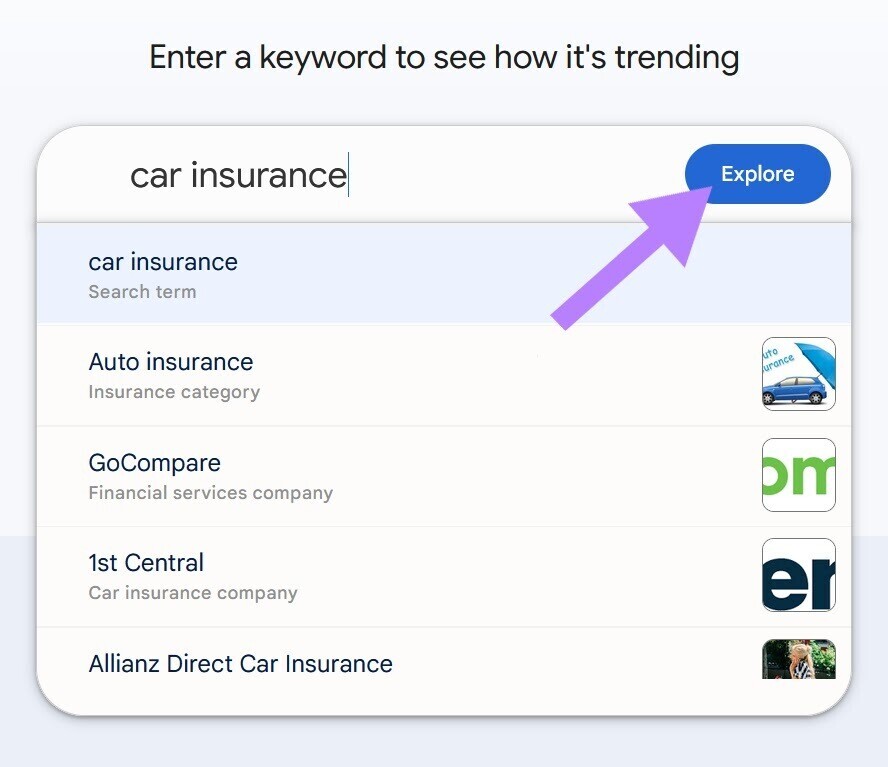
You’ll see whether the interest for that keyword is growing, declining, or remaining steady.
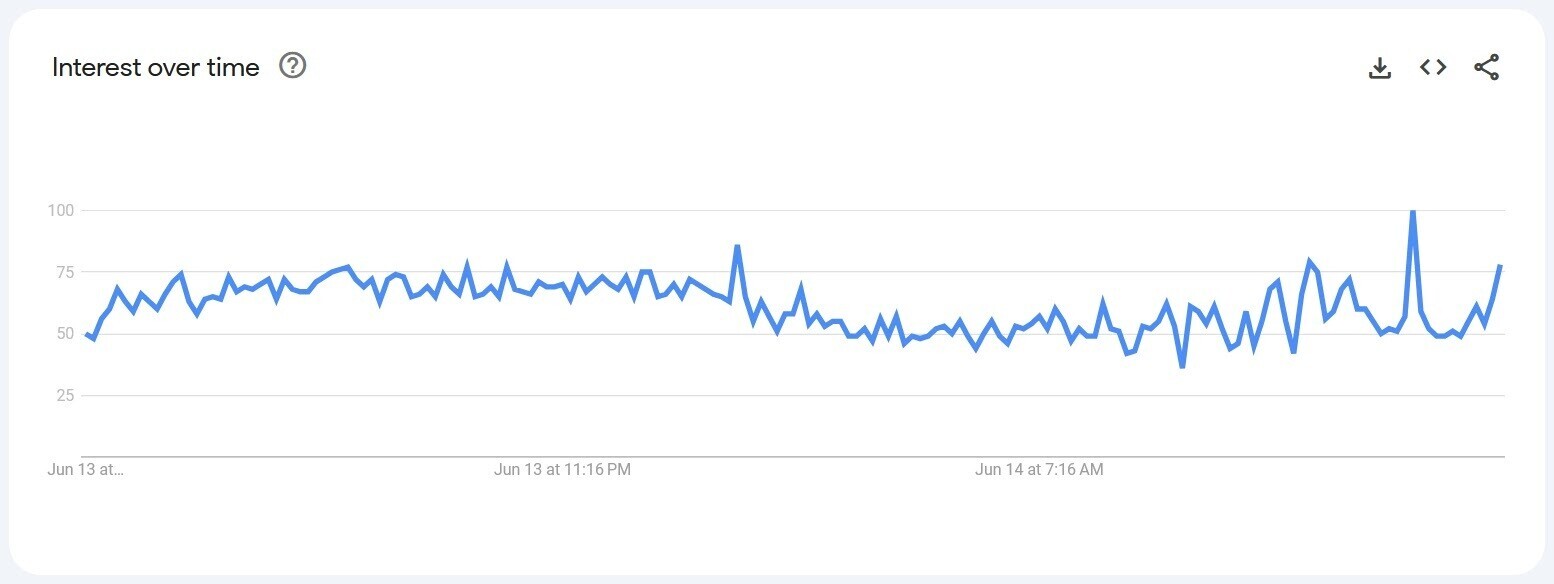
The tool will also show you related queries and topics based on your main keyword.
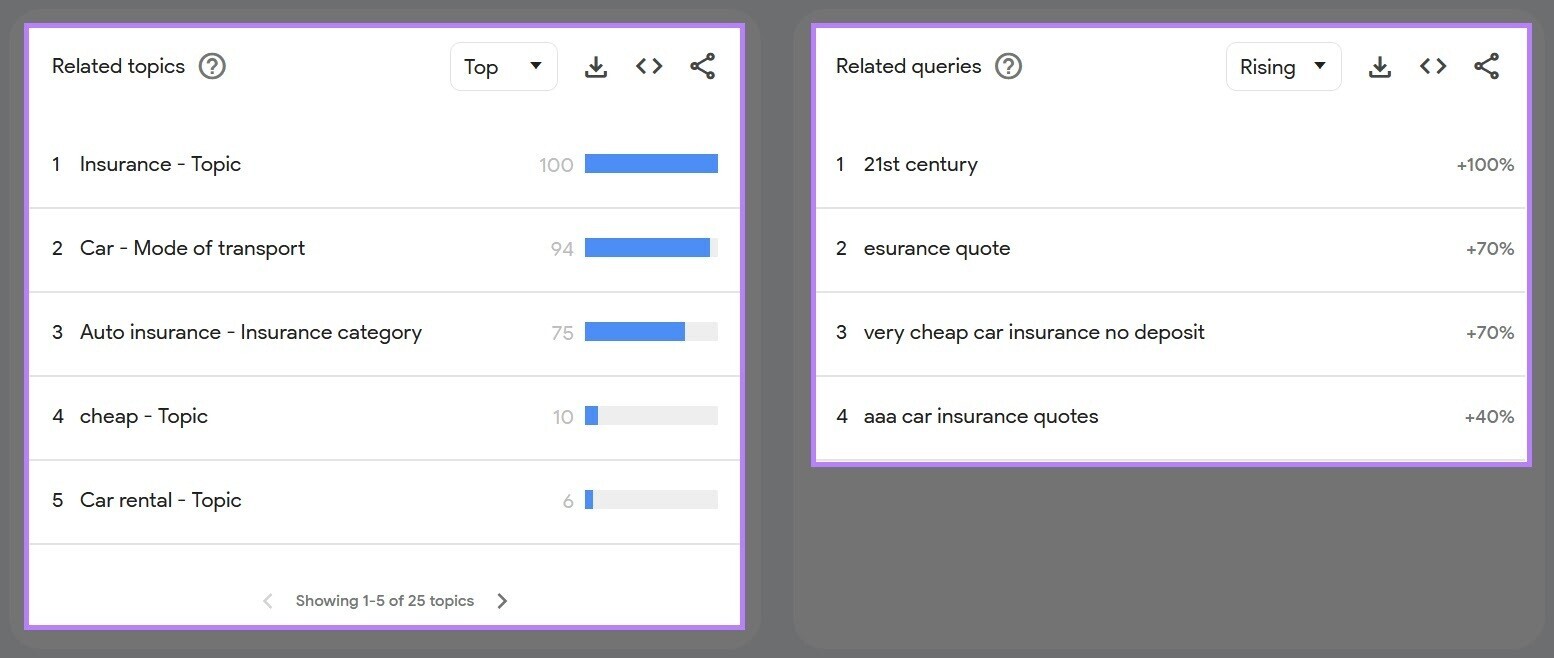
You can even compare two or more keywords against each other to see which keyword is most popular.
For example, if we compare “car insurance” with “auto insurance,” we see more people are searching for “car insurance.”
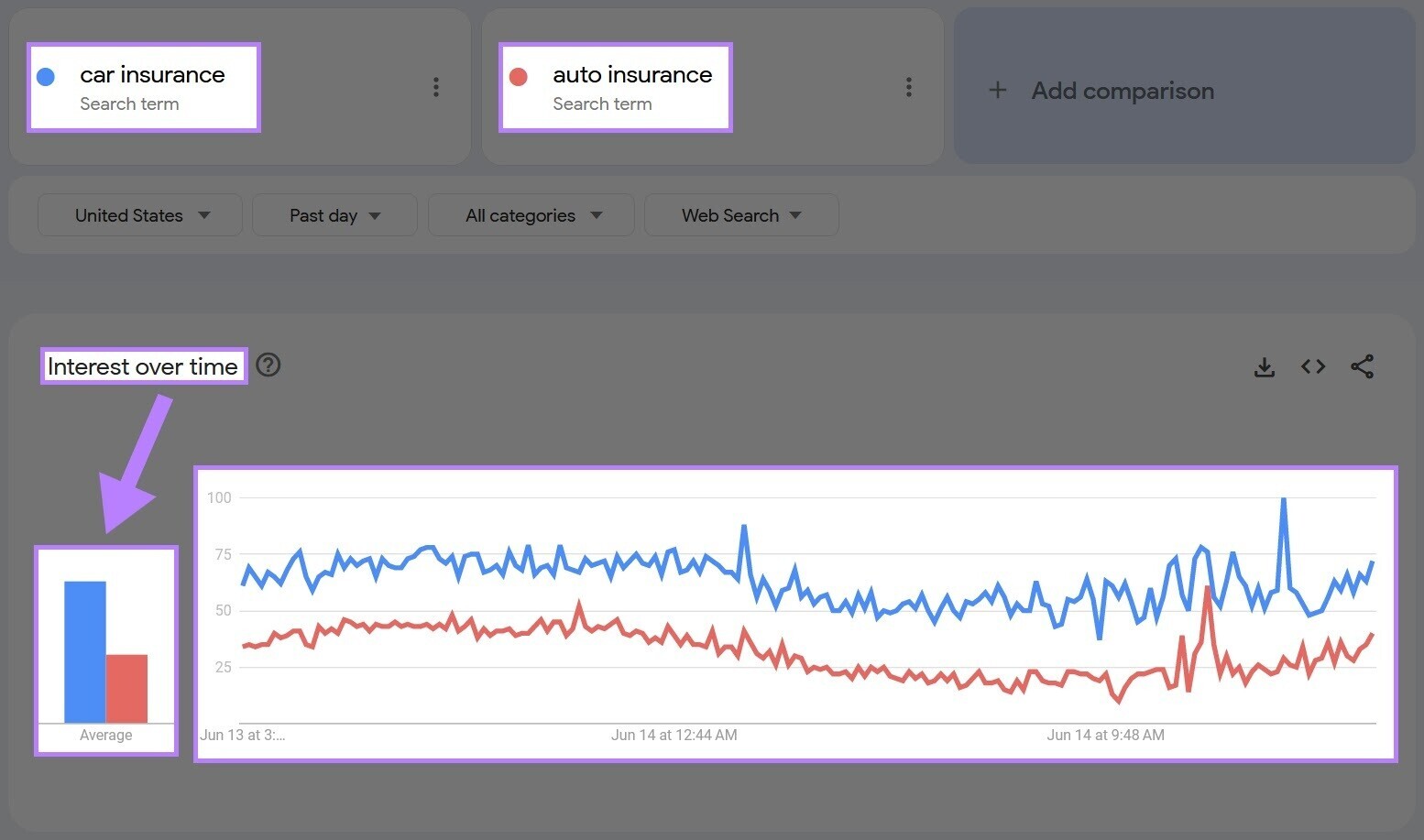
That doesn’t make “auto insurance” a bad keyword to target. It’s just something to take note of. You can target both the keywords if they’re relevant to your business.
Pricing: Google Trends is free.
4. Keyword Manager
Keyword Manager is a keyword tool from Semrush that helps you create and maintain your keywords list.
Once you identify a list of keywords that are relevant for your website, you can use Keyword Manager to manage and track all of them.
For example, if you used the Keyword Magic Tool to find keyword ideas, you can send your chosen keywords directly to Keyword Manager.
In the Keyword Magic Tool, check the boxes on the left-hand side and click “+ Add to keyword list.”
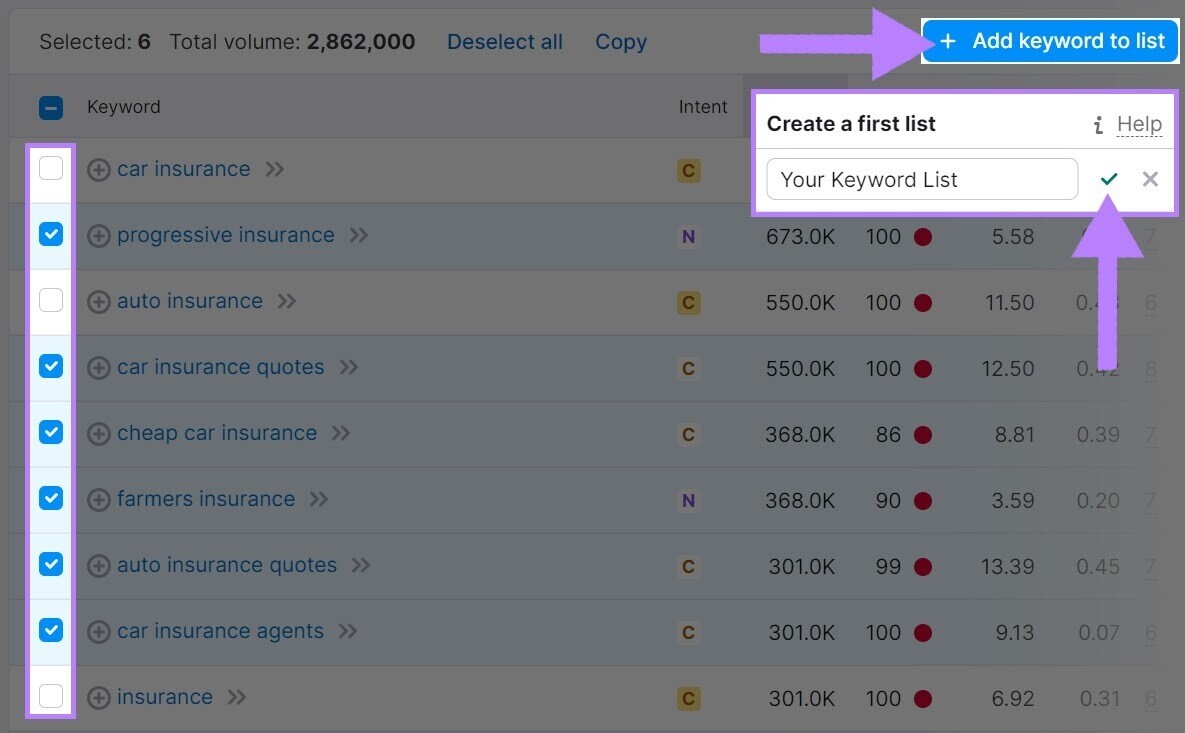
Then, provide a name for your list and click the check mark.
Click “+ Add to keyword list” again and click to open the list.
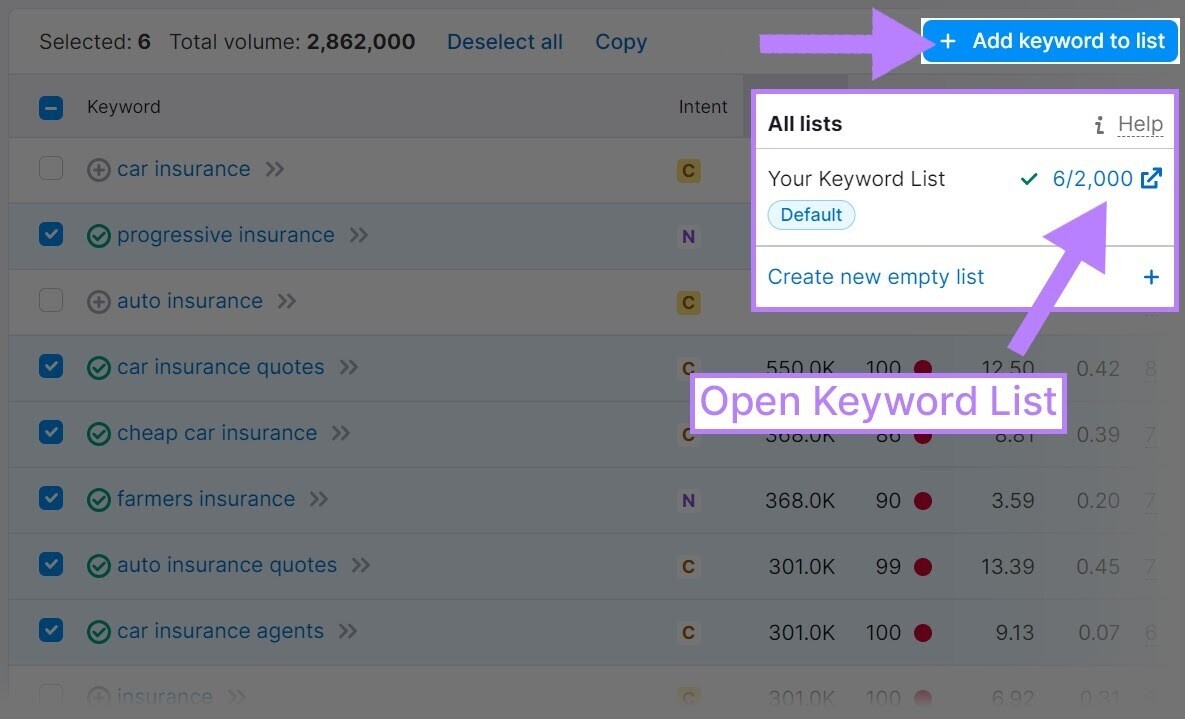
You’ll now be taken to the Keyword Manager tool.
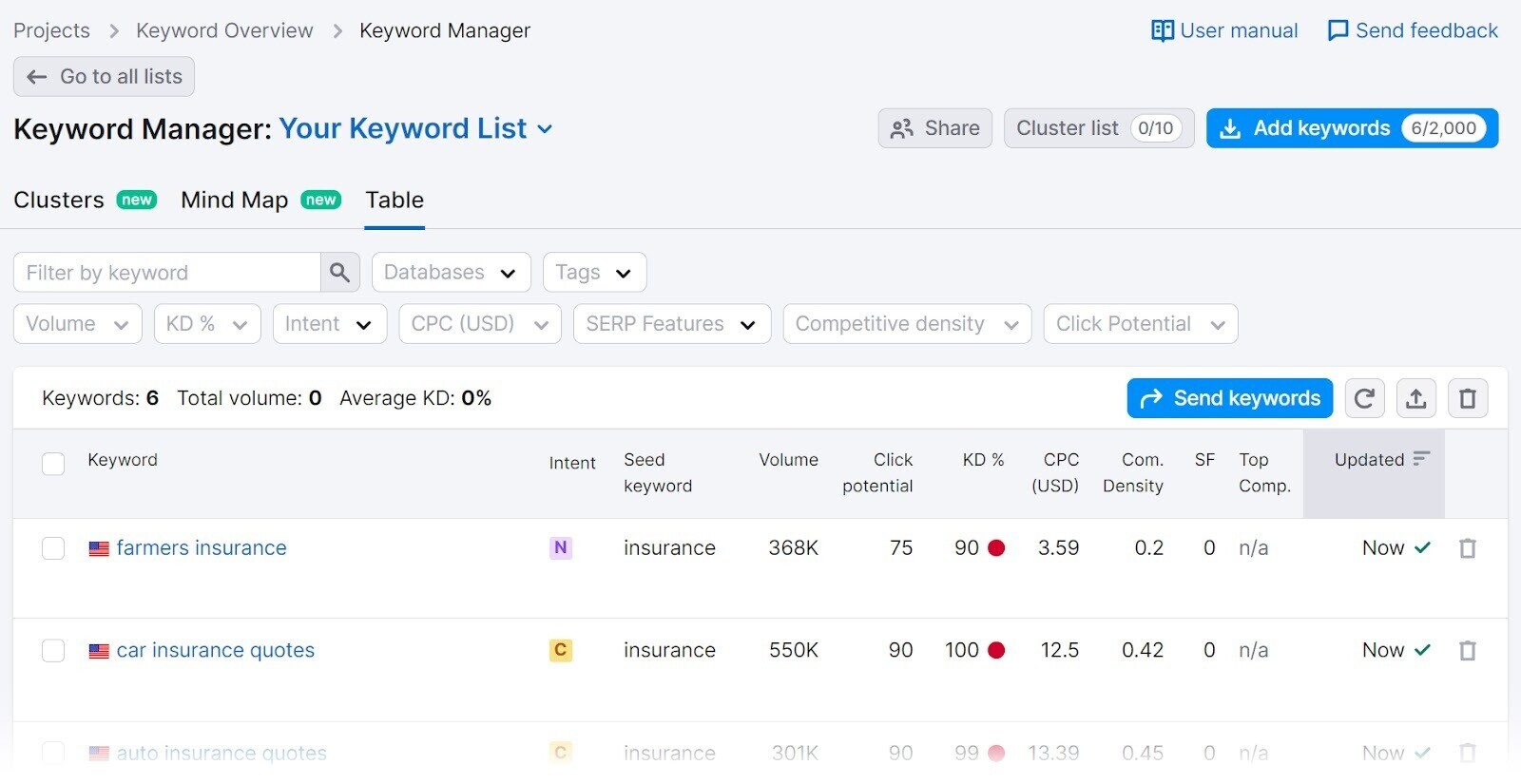
From here, you can do a lot. For example, you can organize your keywords into clusters.
Keyword clustering is a well-known SEO technique where you organize similar keywords based on search intent. The idea is to create one page for each cluster, targeting all the related keywords in a cluster.
This helps you optimize a page for different variations of the keyword to rank for more keywords. And get more traffic.
To create keyword clusters, navigate to the “Clusters” tab and click “Cluster list.”
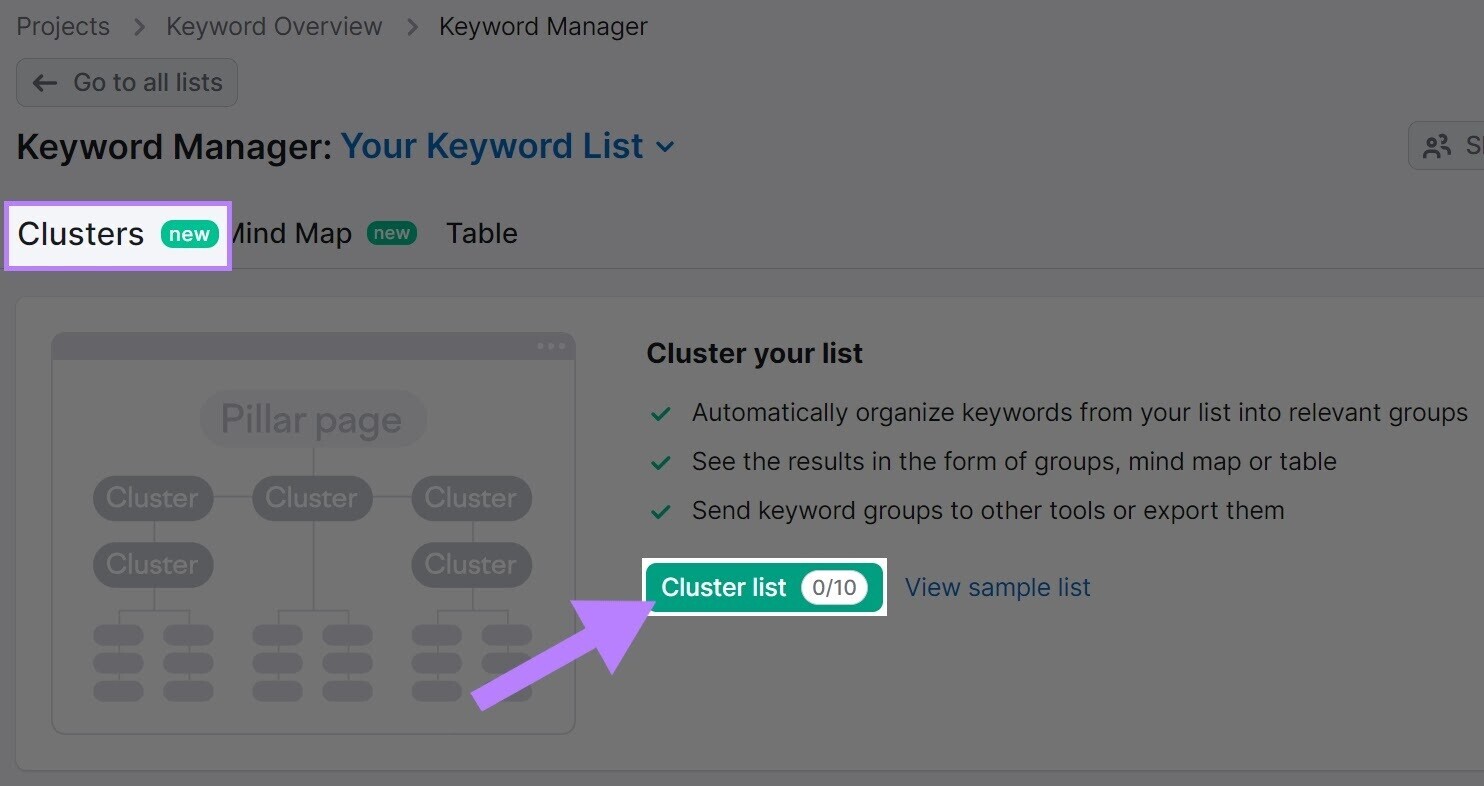
The tool will group your keywords into different clusters. Like this:
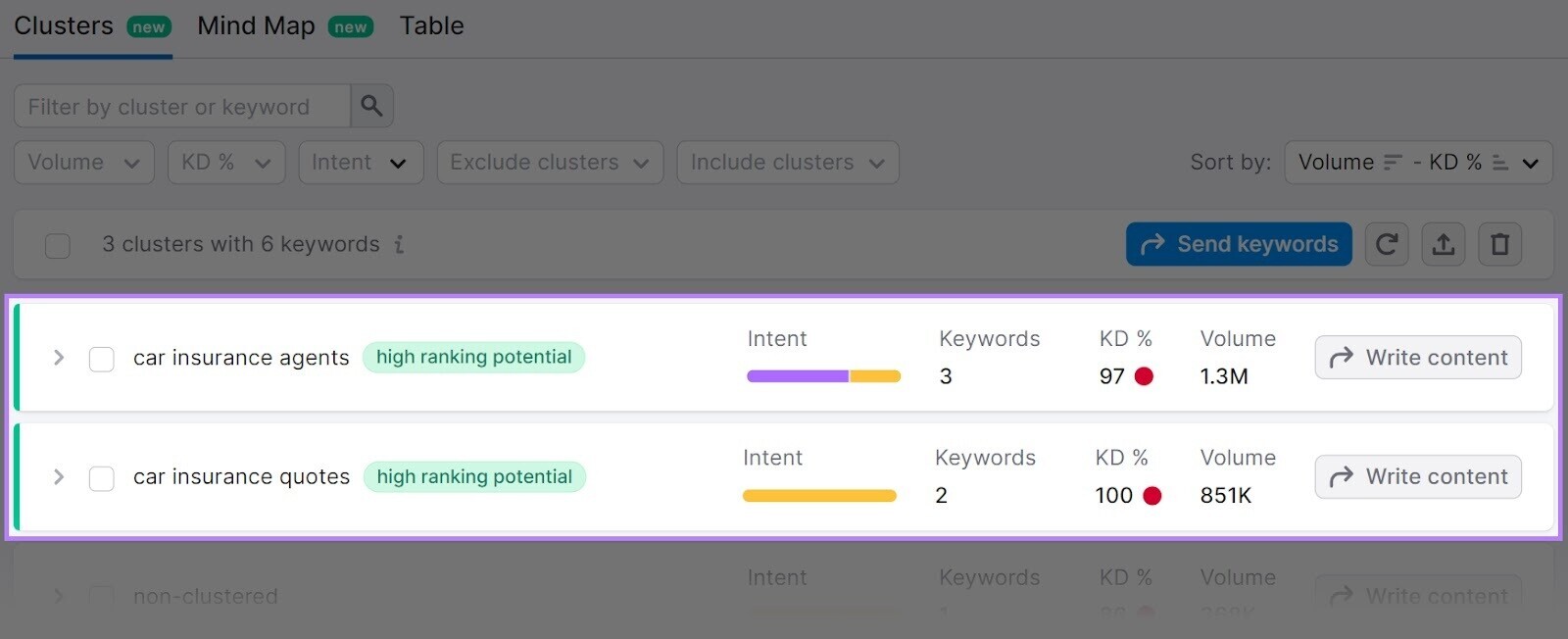
Click on a particular cluster, and you’ll see all the keywords that are part of that group.
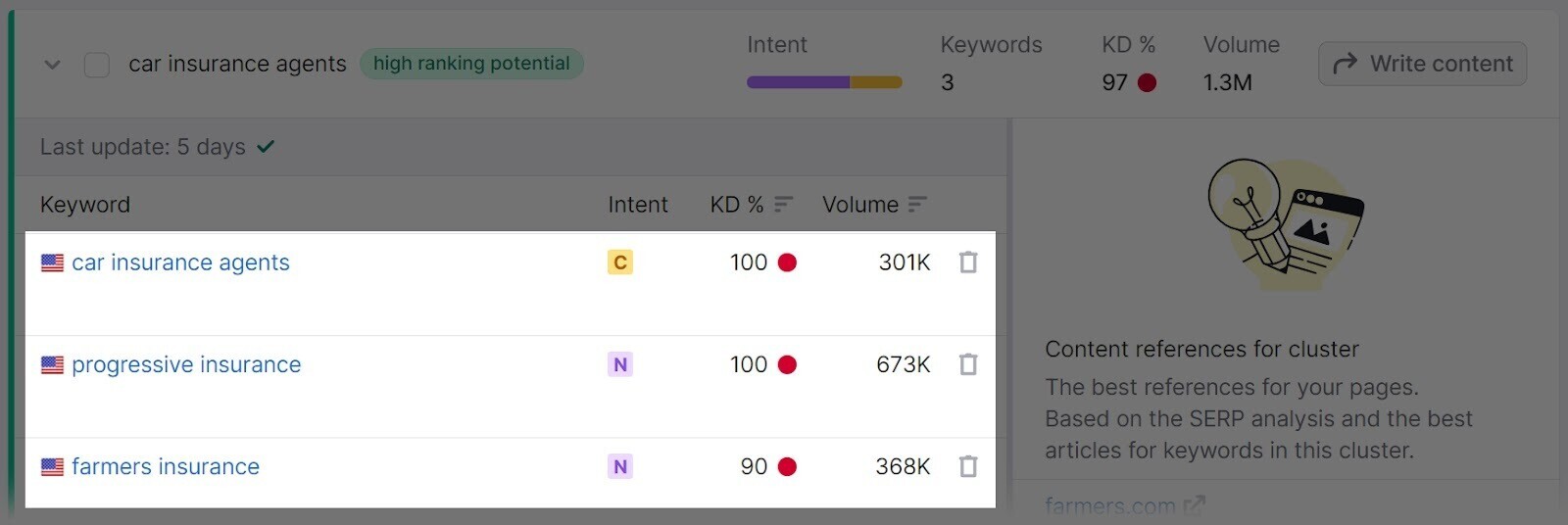
Try to use all these keywords when creating content. So you can rank for all of them.
Price: Keyword Manager is a paid tool. You need to be subscribed to one of Semrush’s paid plans to use it.
Subscriptions start at $108.33 per month (paid annually) and go up to $416.66 (paid annually), depending on the plan you opt for.
5. QuestionDB
QuestionDB shows you the questions people ask on forum sites like Reddit and Stack Exchange. In other words, question-based keywords.
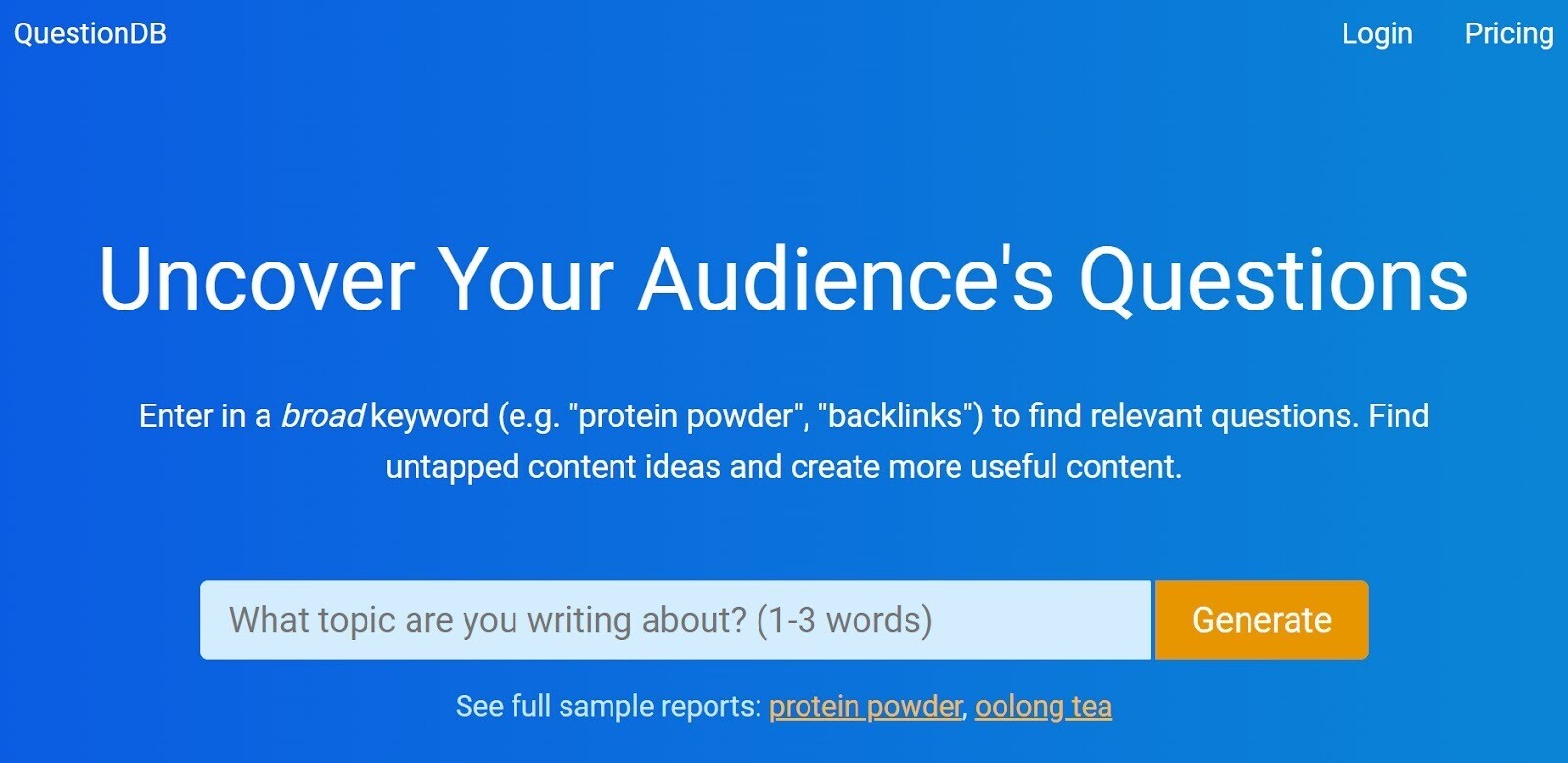
Its huge question database gives you more specific insight into what your audience really wants to know.
You can leverage this insight to create more useful content that answers those questions.
First, come up with a list of related seed keywords.
Then, enter one of them into QuestionDB.
For example, here are a few results for the seed keyword “content creation”:
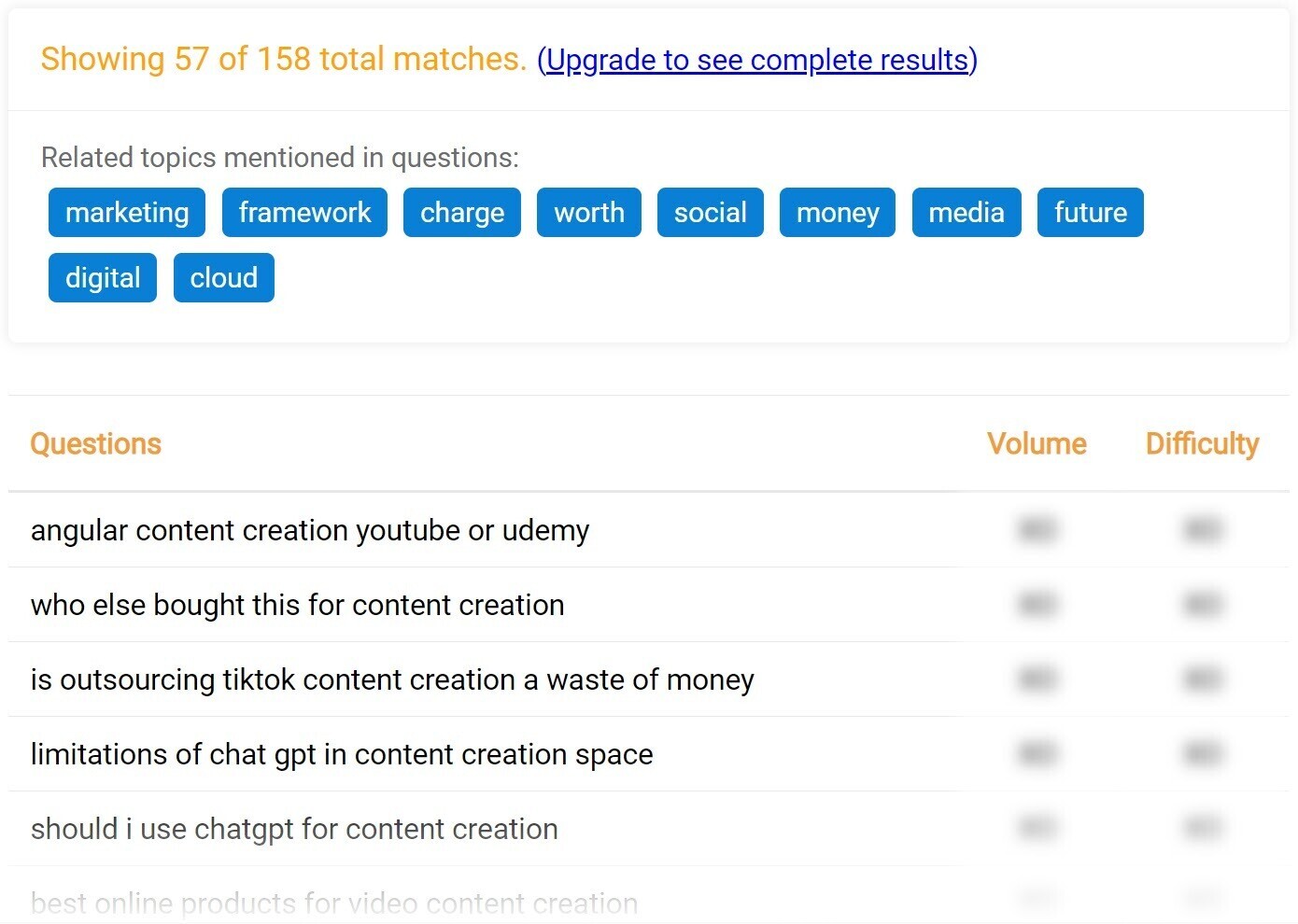
Repeat this process for the rest of your seed keyword list to generate even more keyword ideas.
Price: Free users can view roughly 50 results for their searches.
The most basic plan costs $15 per month and offers 100 searches per month with unlimited results for each search.
6. Organic Research
Semrush’s Organic Research tool helps you unlock information about your competitors’ keyword data.
It’s very difficult to find these keywords without a tool like Organic Research.
Let us show you how to use it.
Open the tool, enter a competitor’s domain, and click “Search.”
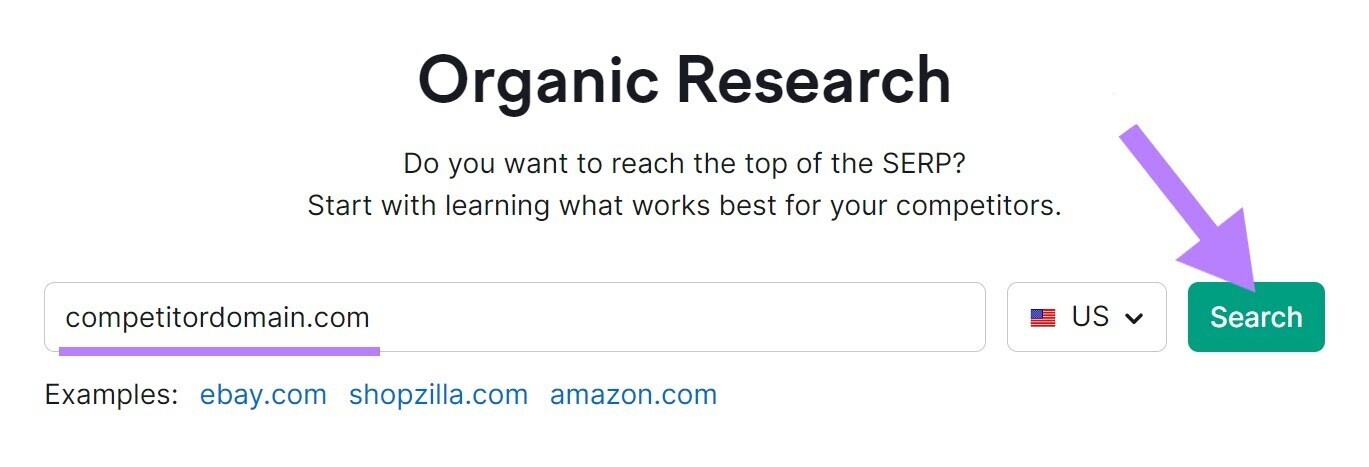
You’ll see lots of different data points.
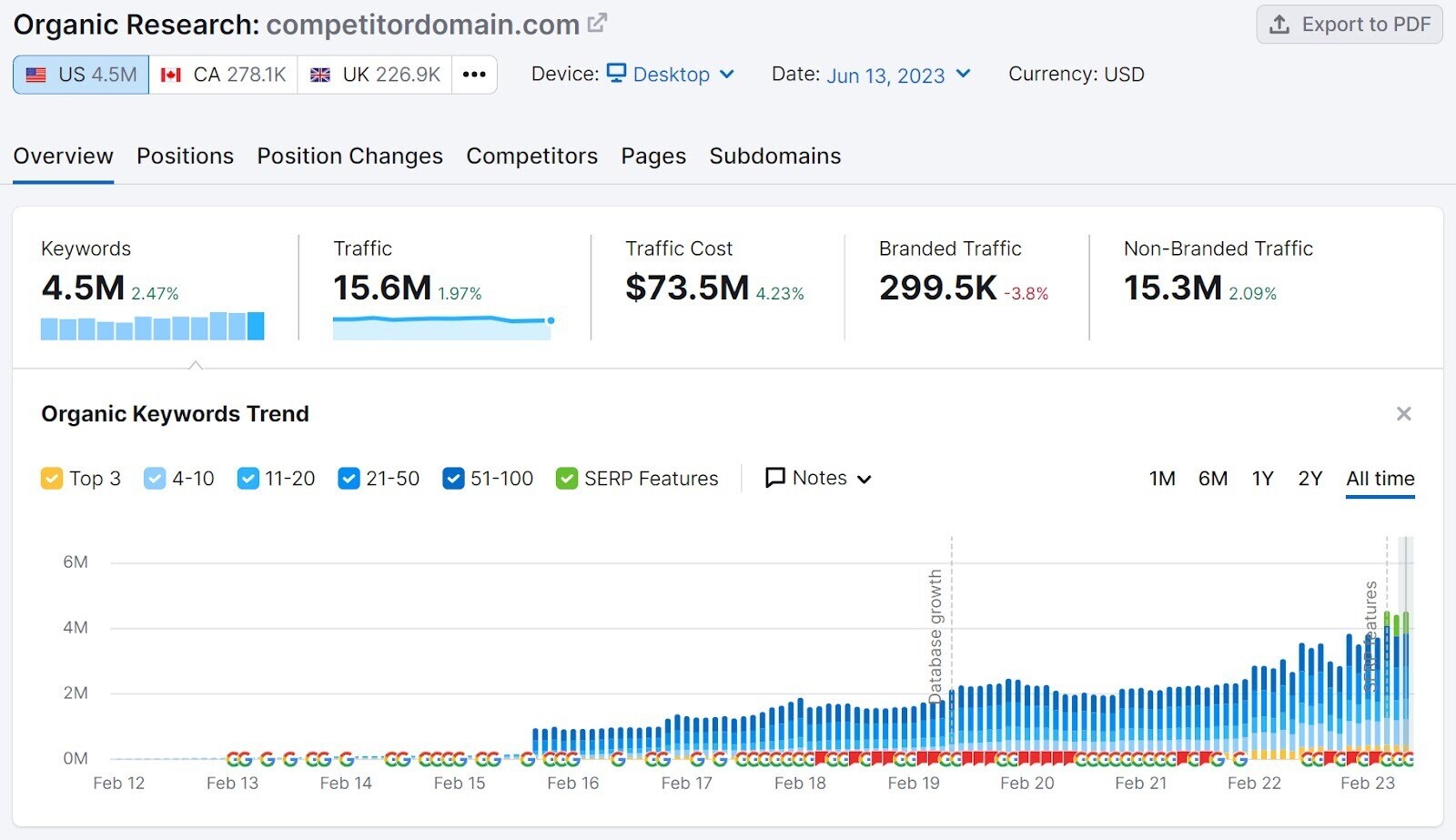
Go to the “Top Keywords” section and click the “View all X,XXX keywords” button.
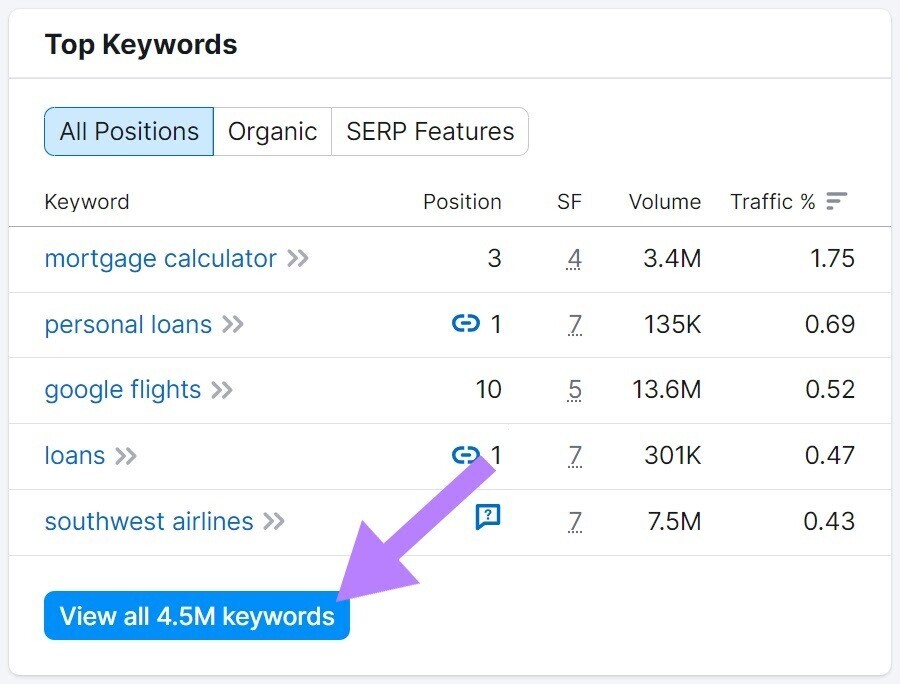
You’ll see all the keywords that competitor ranks for in Google’s top 100 results.
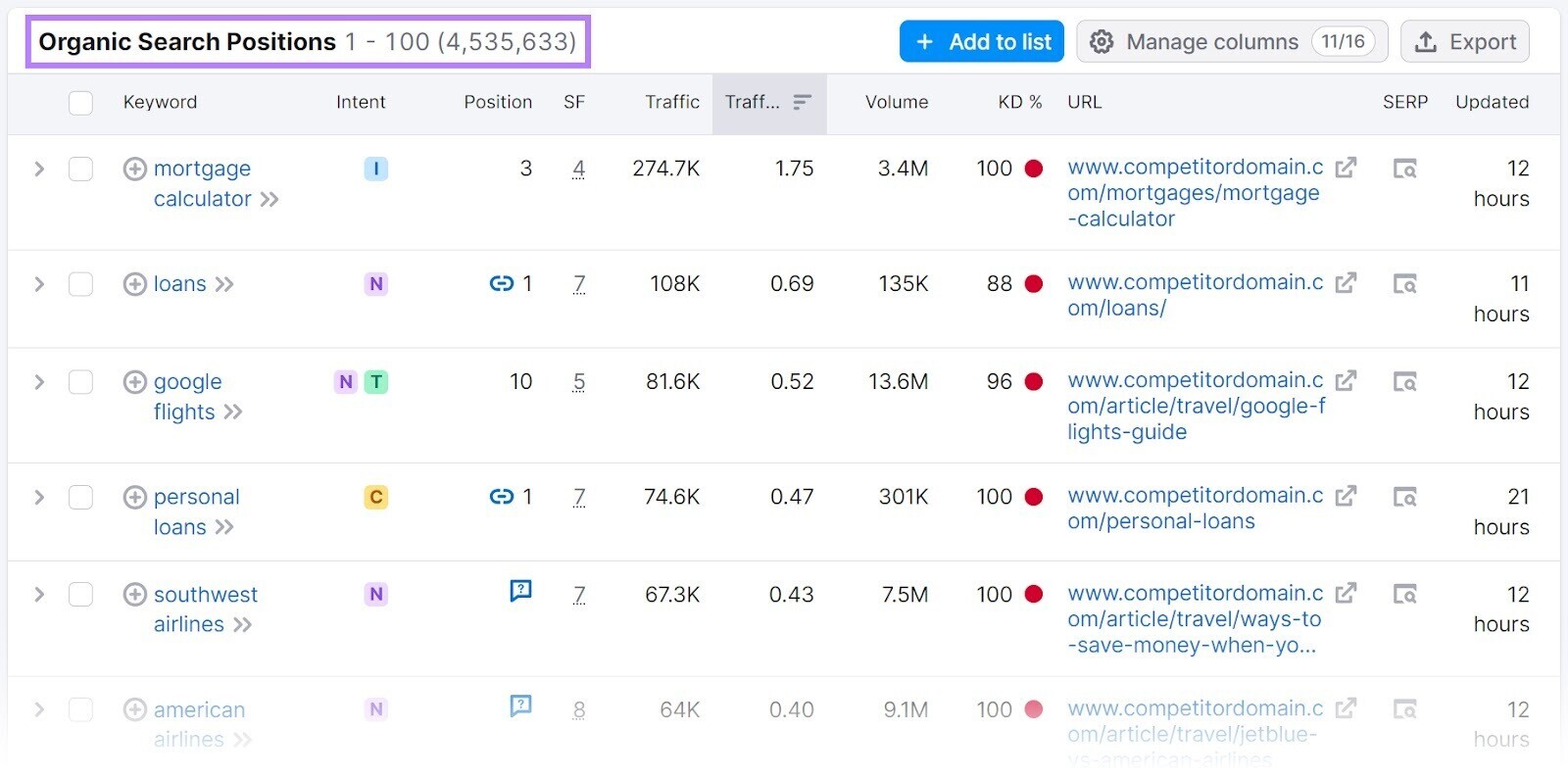
If the list is massive and you want something more manageable, apply one or more of the following filters:
- Positions
- Volume
- KD
- Intent
- SERP features
Like this:
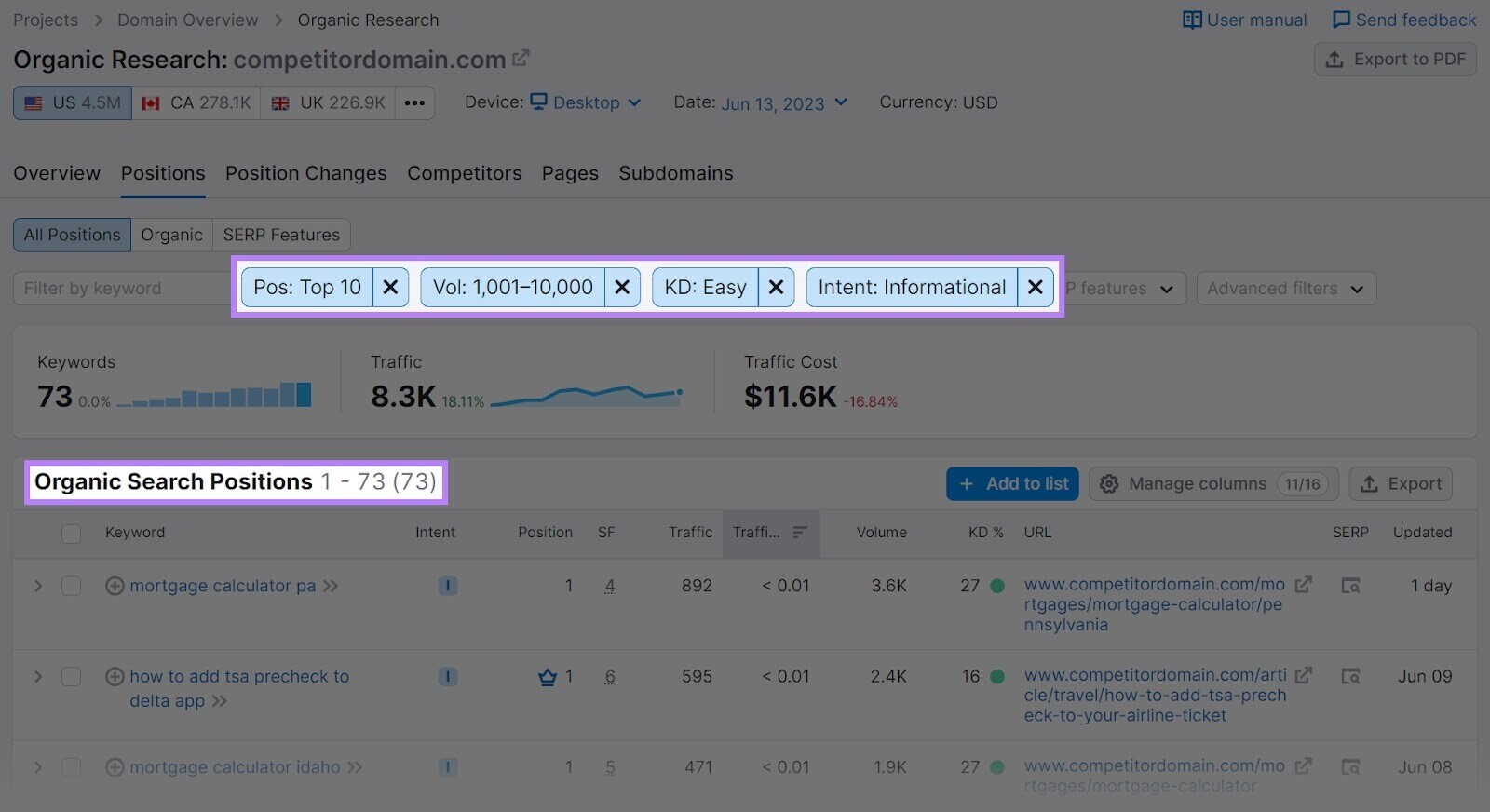
You can also export this data into an Excel sheet. Just click on the “Export” button in the right-side corner at the top of the table.
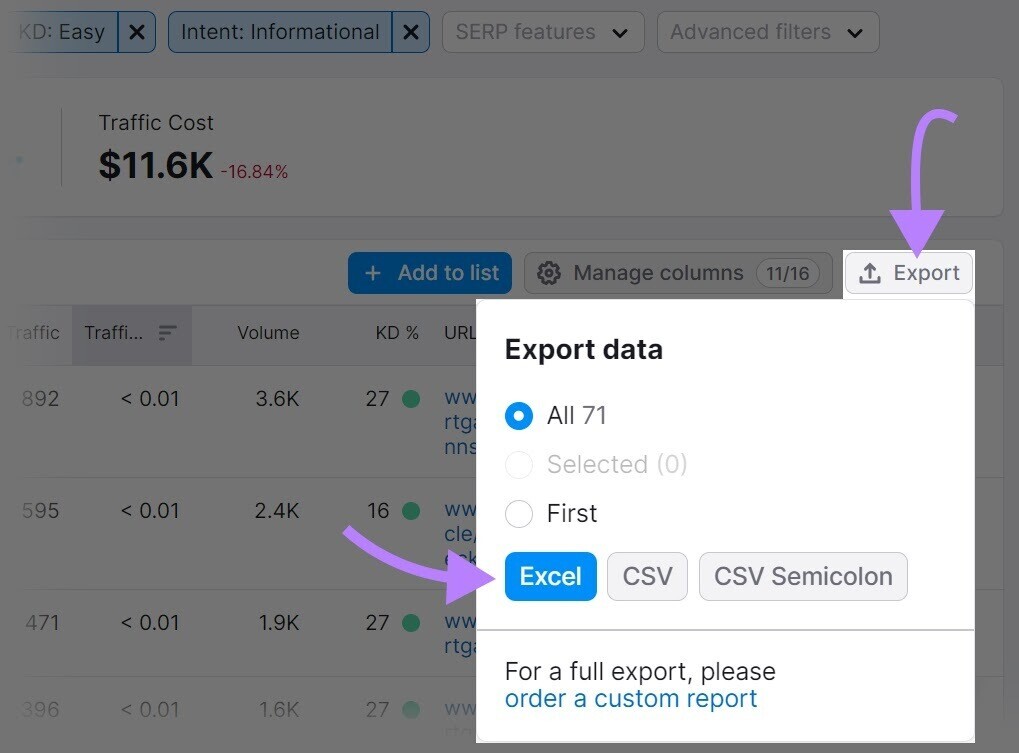
This feature is super handy when you’re in a hurry and want to analyze those keywords later.
Price: Organic Research is a freemium tool. Sign up for free to get 10 free searches per day. But the available keyword data will be limited.
With the paid plan, you can unlock more data. Pricing starts at $108.33 per month paid annually or $129.95 per month paid monthly.
7. AlsoAsked
AlsoAsked aggregates questions from Google’s People Also Ask (PAA) boxes, which are gold mines for question-based keywords surrounding your main topic.
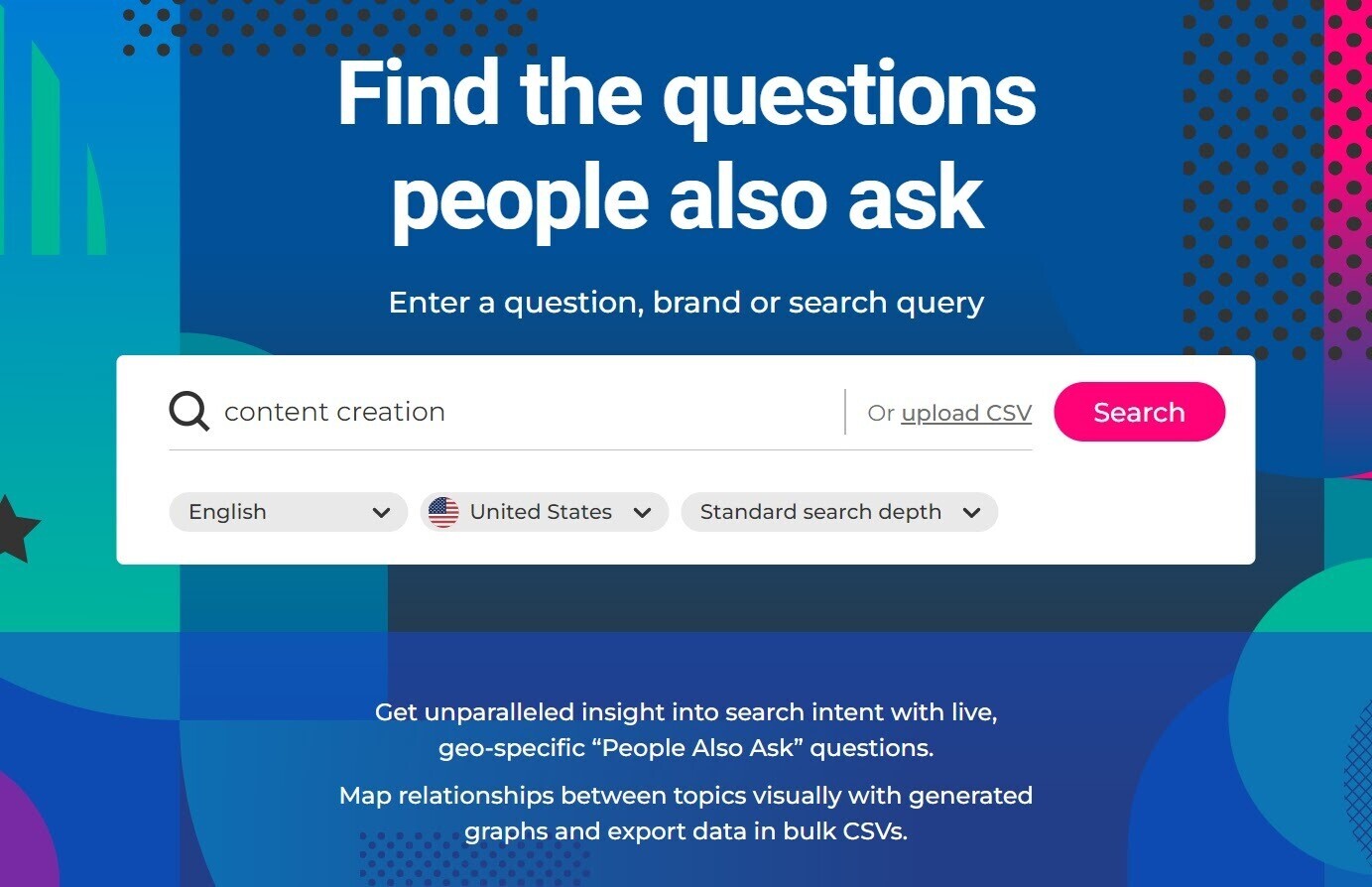
The tool shows all the question keywords on a branching diagram that illustrates the relationship between them.
For example, here are the questions AlsoAsked finds if you search “content creation” in the United States:
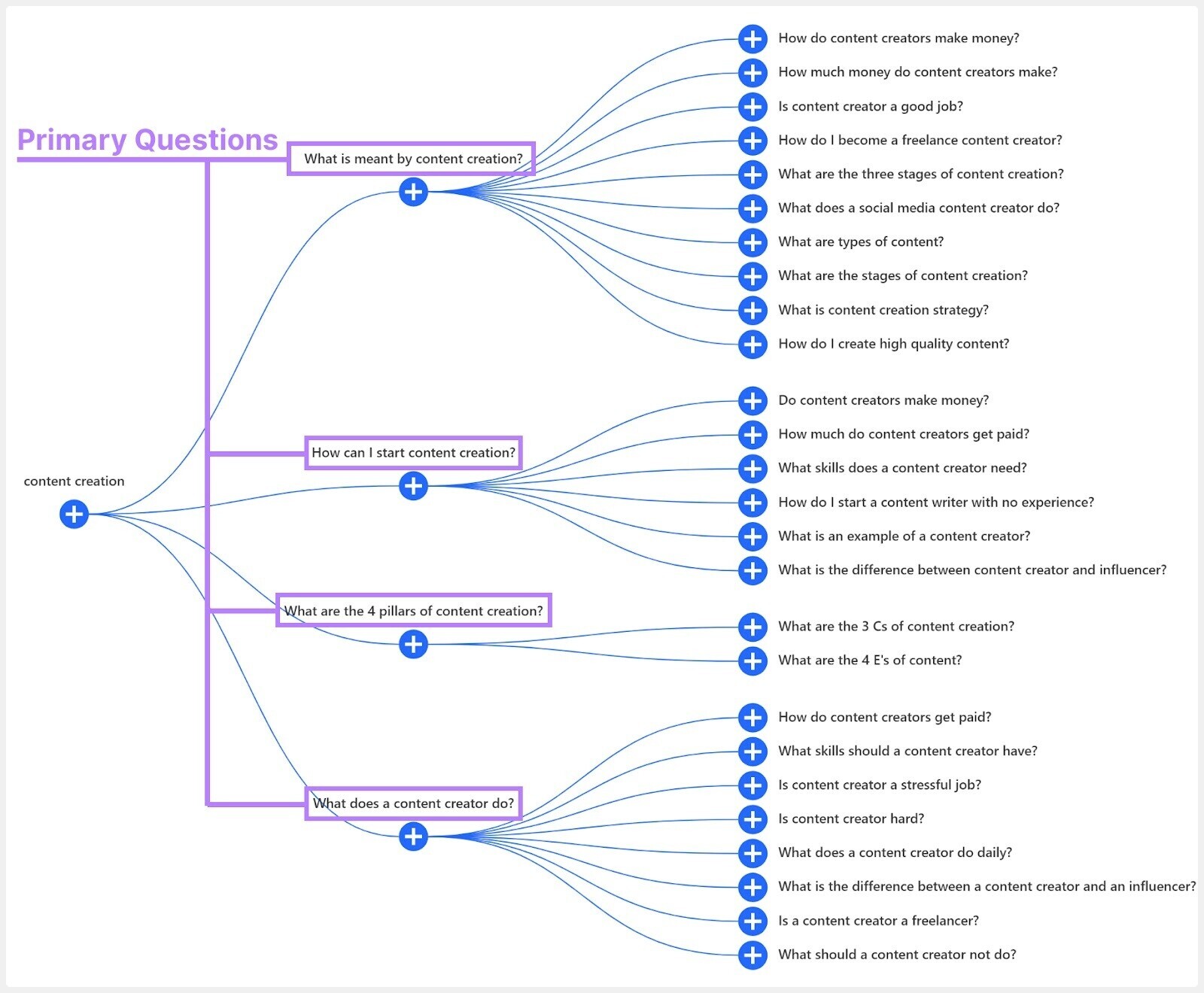
Searching for “content creation” generates four primary questions:
- What is meant by content creation?
- How can I start content creation?
- What are the 4 pillars of content creation?
- What does a content creator do?
These questions have their own PAA results. Those new questions display additional branches.
If you click on one of the branches, you can view a new diagram starting from that point.
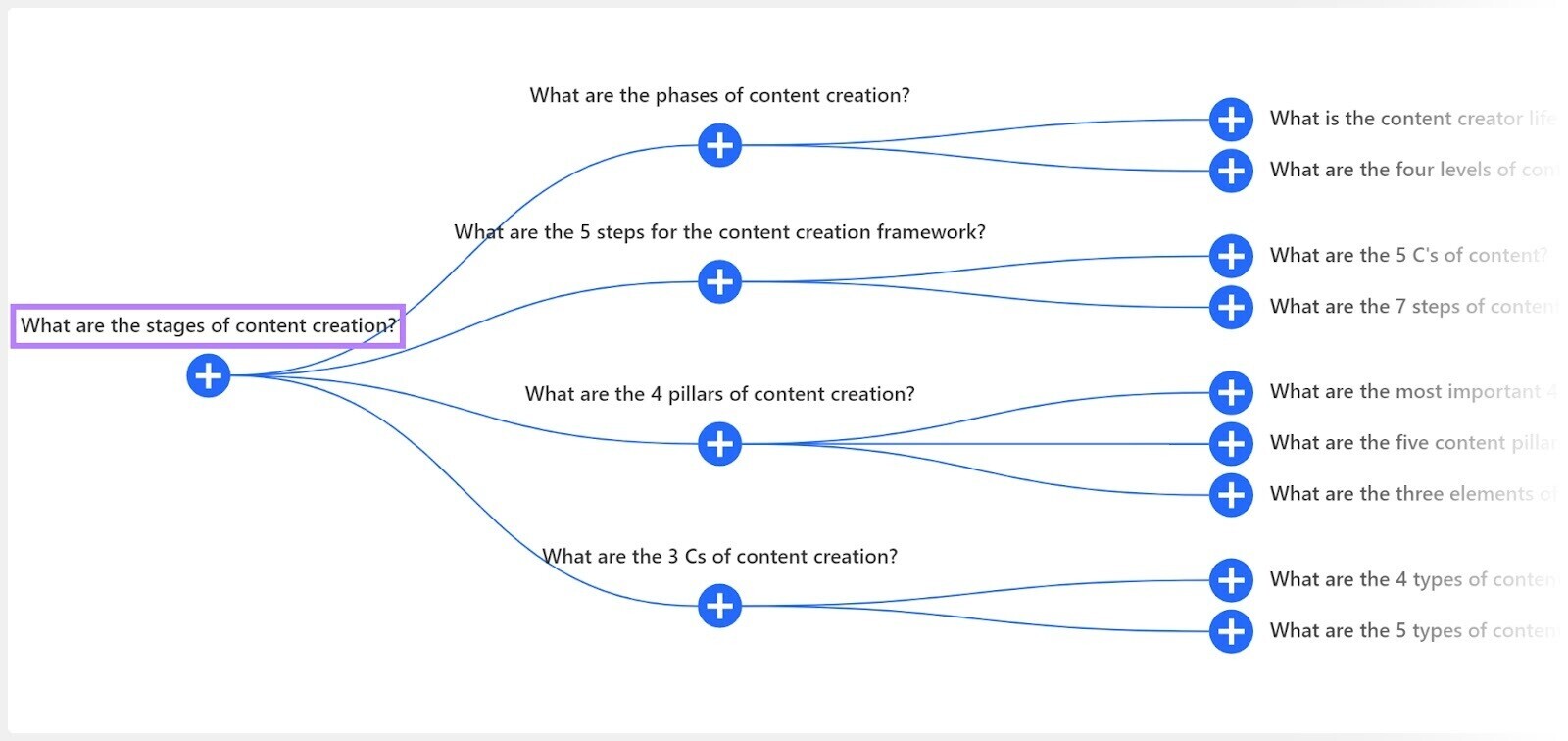
This doesn’t just show topics you could cover. It also shows you the relationships between these questions. Which can help you structure your articles.
This way, you’re covering all the most important questions in the order they’re likely to get asked.
You can also export this data as a CSV (for Lite and Pro plans) or an image to use for analysis or presentations.
Price: AlsoAsked is a free keyword research tool, but there are also paid options.
A free account allows you to perform 10 searches every month. The paid plans start at $15 per month, giving you 100 searches per month.
8. Keyword Surfer
Keyword Surfer is a free keyword research tool in the form of a Google Chrome extension. It allows you to see keyword suggestions directly in the SERPs (search engine results pages).

Upon installation, the tool will automatically show keyword suggestions in a panel on the right side of the SERP.
It shows related keywords, their overlap with the original search query (the percentage of search results shared with the original search query), and their search volume.
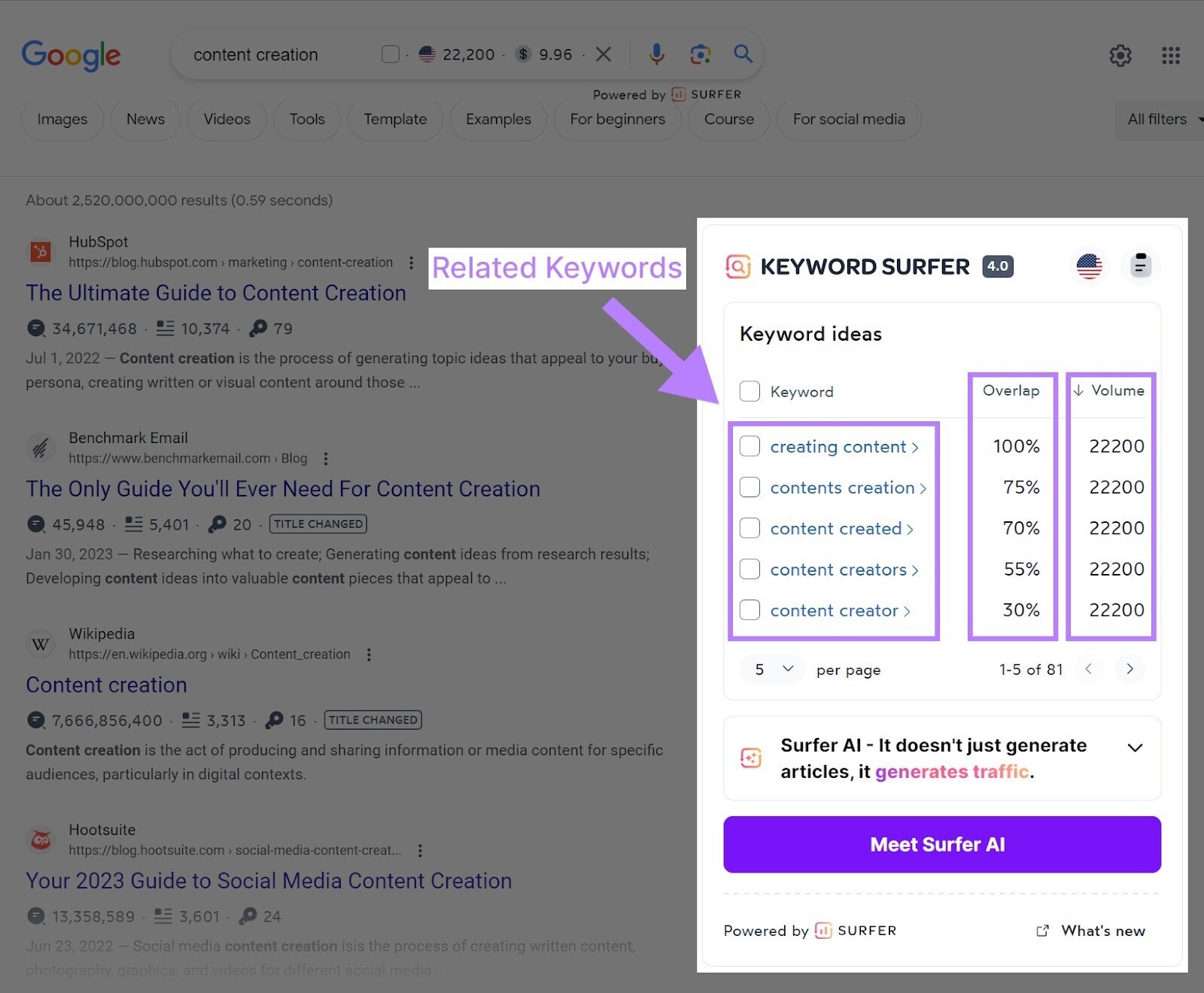
Besides the keyword ideas, it also shows useful information about every search result.
Namely:
- Estimated monthly traffic
- The number of words on the page
- How many times the exact search phrase appears on a page
- A “TITLE CHANGED” badge in case Google has changed the original title tag

To sum up:
Keyword Surfer allows you to enrich your search results with useful data about the ranking pages. And quickly find new keyword opportunities based on your search query.
Price: Keyword Surfer is a freemium tool. The cost of their most basic plan (called “LITE”) is $19 per month (billed annually).
9. Keyword Gap
The Keyword Gap tool helps you dig through your competitors’ keyword profiles to see how many keywords you share with your competitors (i.e., common keywords). As well as keywords they rank for, but you don’t (i.e., missing keywords).
The missing keywords are basically new keyword opportunities for your website.
First, open the tool, enter your domain and up to four competitors, and click “Compare.”
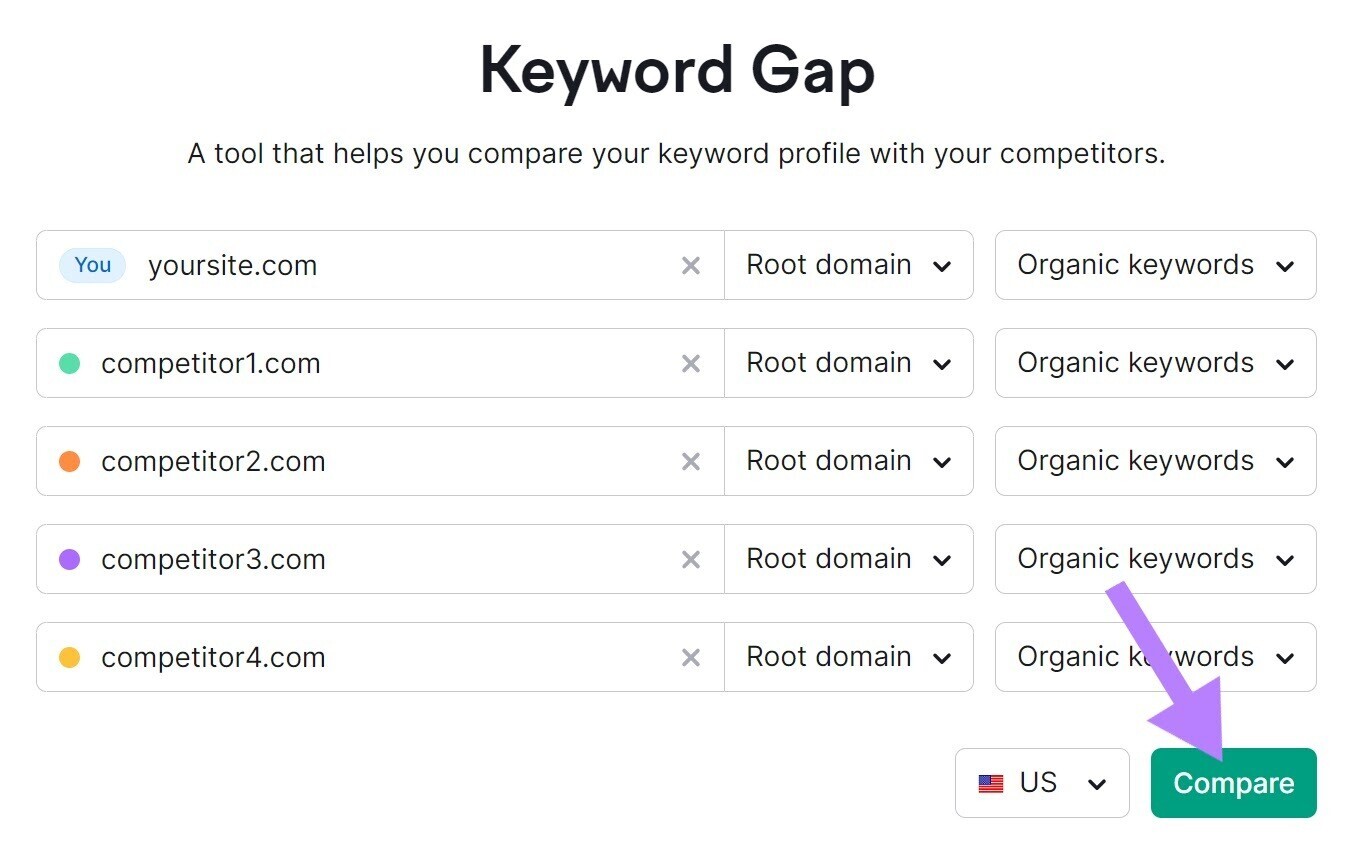
The tool will generate a comprehensive report for you.
The “Keyword Overlap” section of the report shows you the relative size of each domain’s keyword profile and how much they overlap.
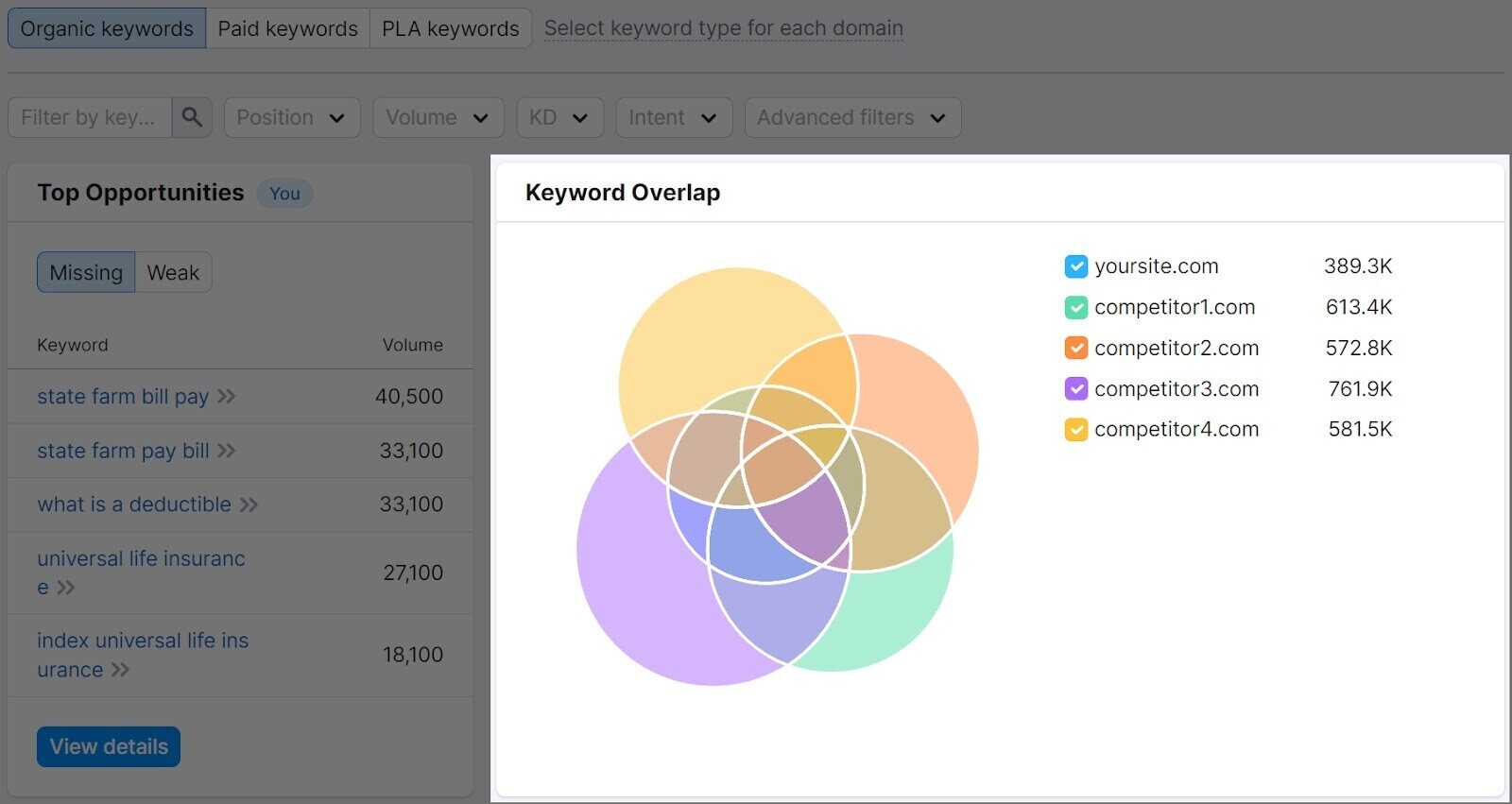
Below, you can analyze your current keyword profile against your competition.
Focus on the “Missing” and “Weak” tabs to find keywords you haven’t targeted yet. Or those you could perform better for.
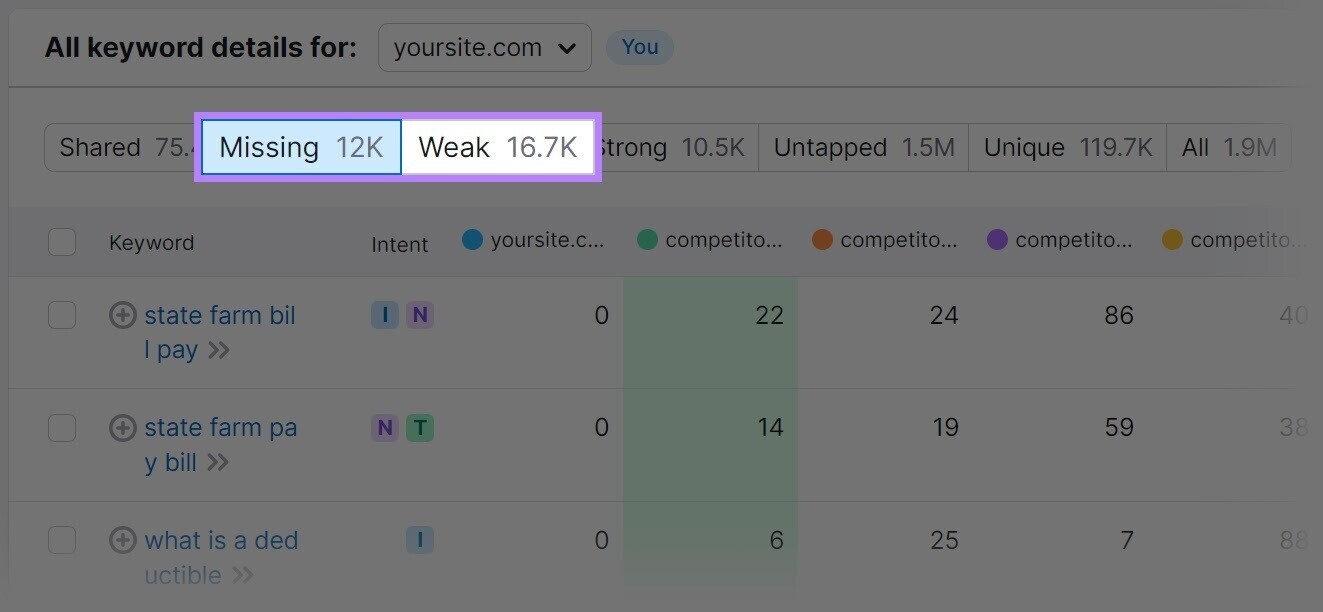
Click on keywords you’d like to learn more about. Or send them to Keyword Manager so you can reference them later.
Price: Keyword Gap is a freemium tool. You can perform 10 comparisons per day for free.
For more, you’ll need to subscribe to a paid plan. Pricing starts at $108.33 per month paid annually or $129.95 per month paid monthly.
10. AnswerThePublic
AnswerThePublic is a keyword research tool that uses autocomplete suggestions from search engines like Google to find questions people are searching for.
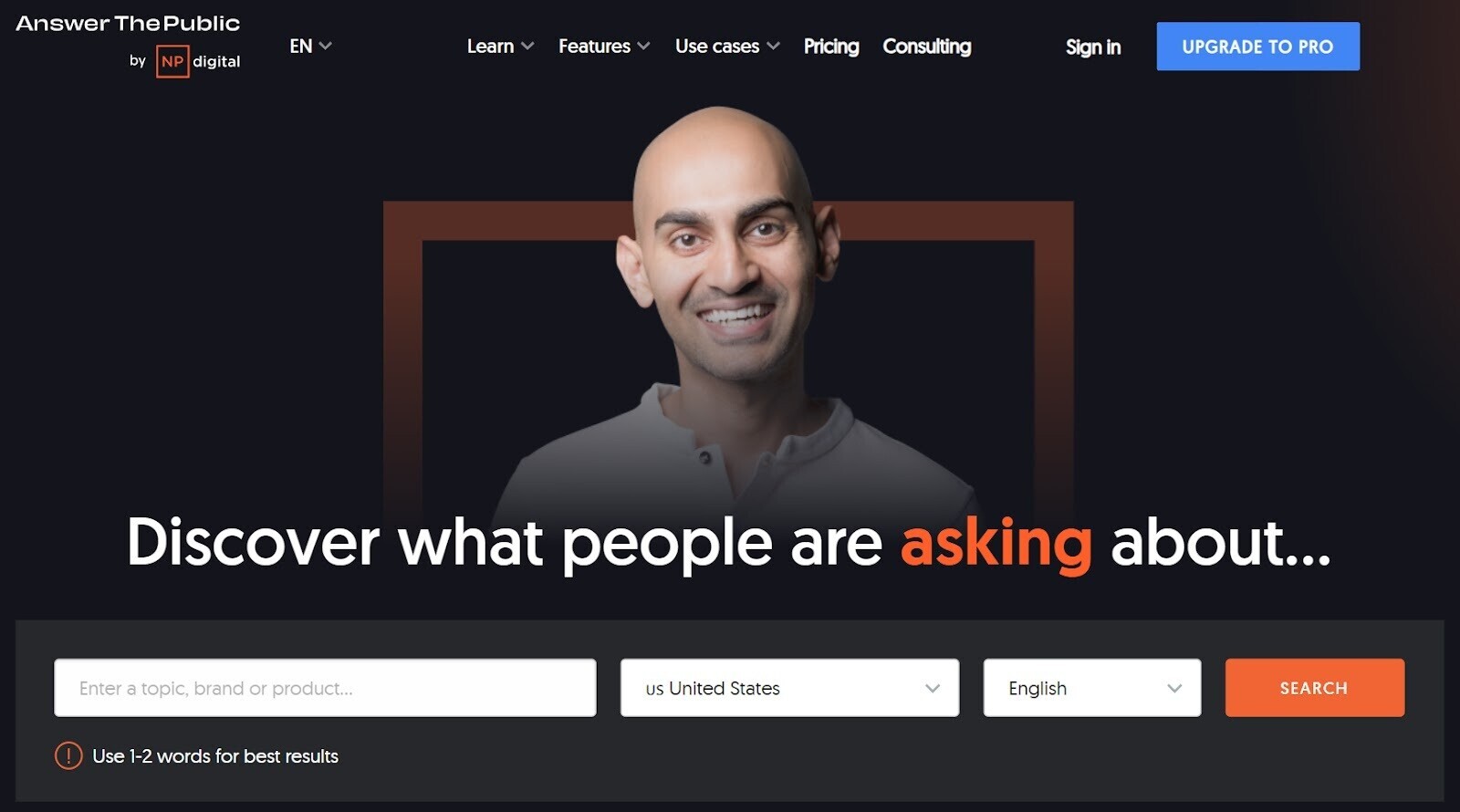
In this example, we’ll use “content creation” as our seed keyword and look at the search data from the United States.
The tool will quickly show all the queries it finds related to “content creation,” grouped in a visually appealing way like this:
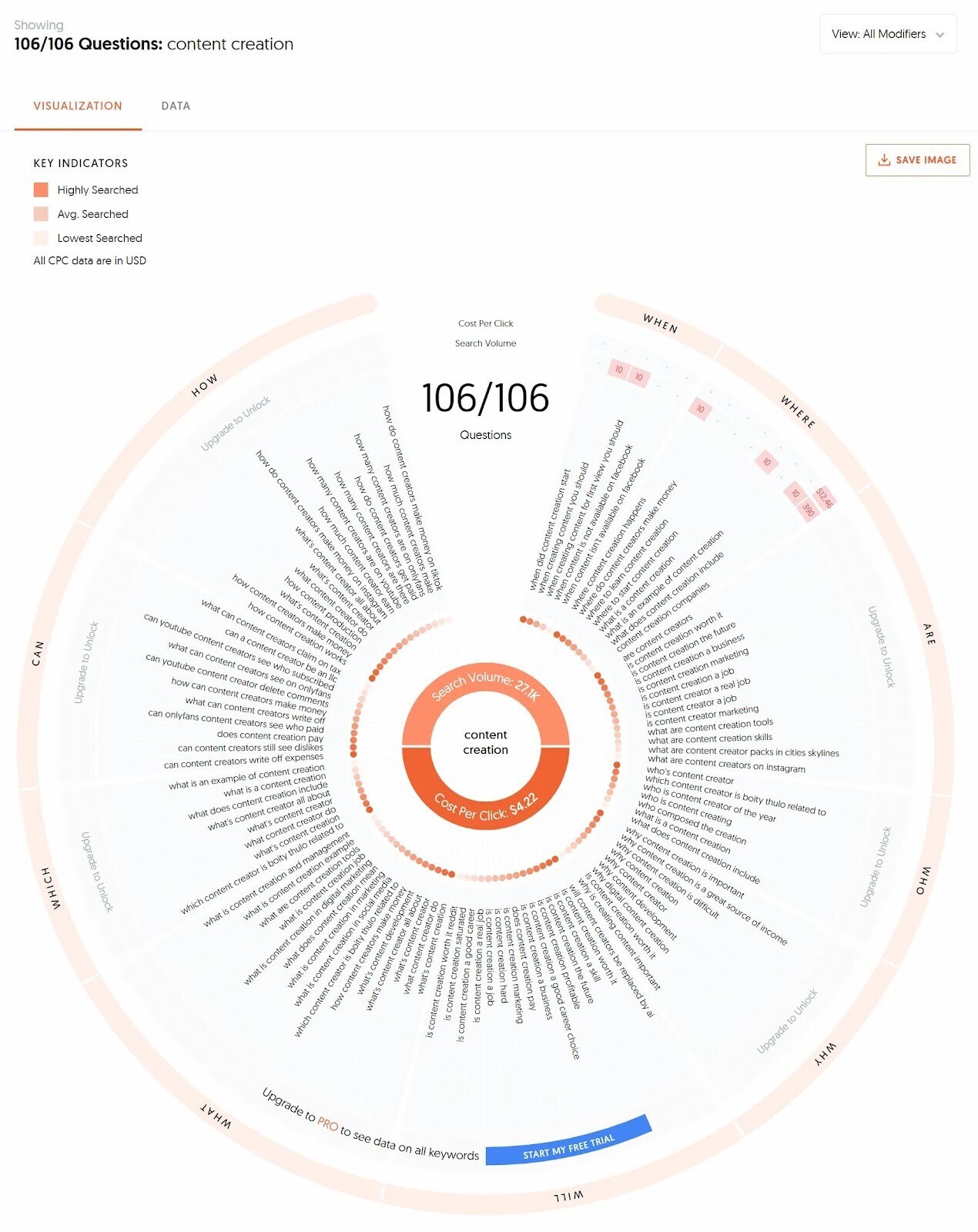
The search terms marked with a darker shade of orange are more popular.
You can also view the same data laid out in lists:
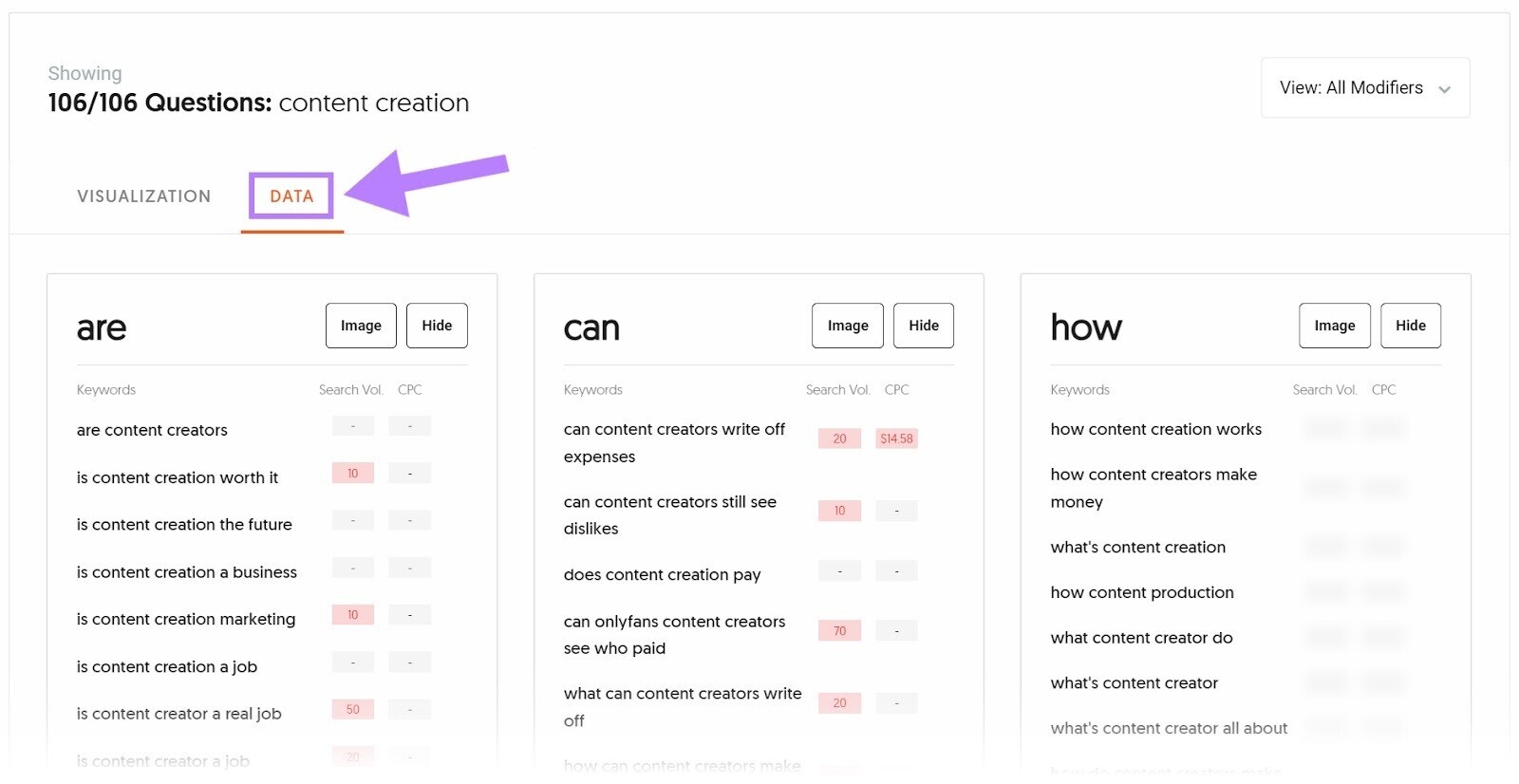
All these questions help you understand what your audience wants to know. And you can provide answers in your content to rank for those keywords.
In addition to questions, you can also find:
- Search phrases by a preposition (e.g., “content creation for social media”)
- Comparisons (e.g., “content creation vs. marketing”)
- Alphabeticals (e.g., "content creation apps” would be grouped under "A”)
- Related searches
Price: You can use AnswerThePublic for free, but the number of searches you can run is limited.
Their paid plans start at $5 per month, giving you 100 searches per day. Which is more than enough for beginners.
11. TubeBuddy
TubeBuddy is a browser extension that helps you perform YouTube-specific keyword research. To optimize and grow your YouTube channel.
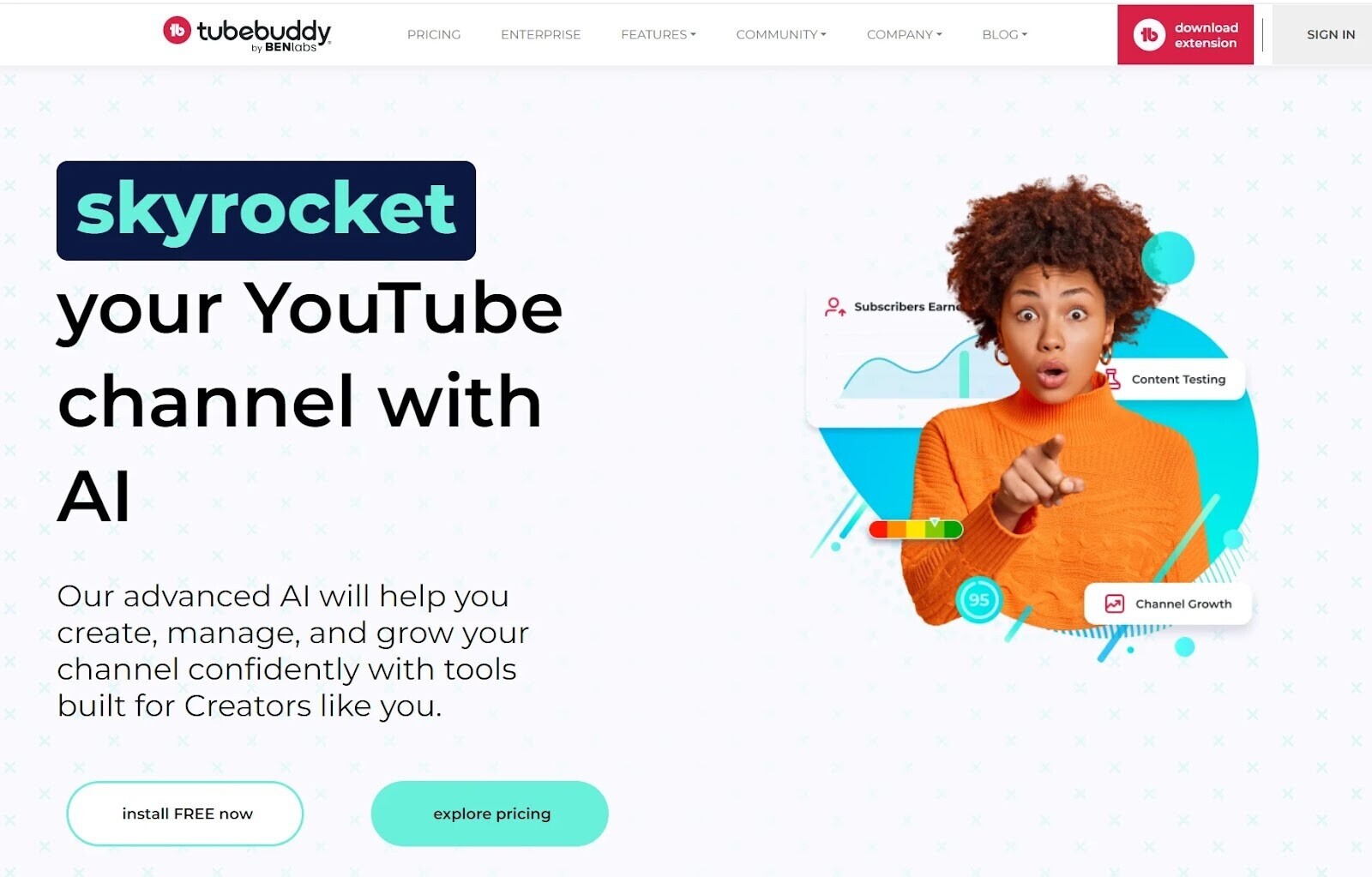
It uses its Keyword Explorer feature to do that.
To use it, enter a keyword you’re interested in, and click “EXPLORE.”
In the “Summary” tab, you’ll find a score for your keyword out of 100.
This score considers the amount of competition you have and how well optimized the top-ranking videos are.
The higher the score, the more competition you have. The lower the score, the less competition you have for a keyword.
Here, you’ll also find a breakdown of interest over time for that keyword on YouTube and Google, as well as related video topics and tags.
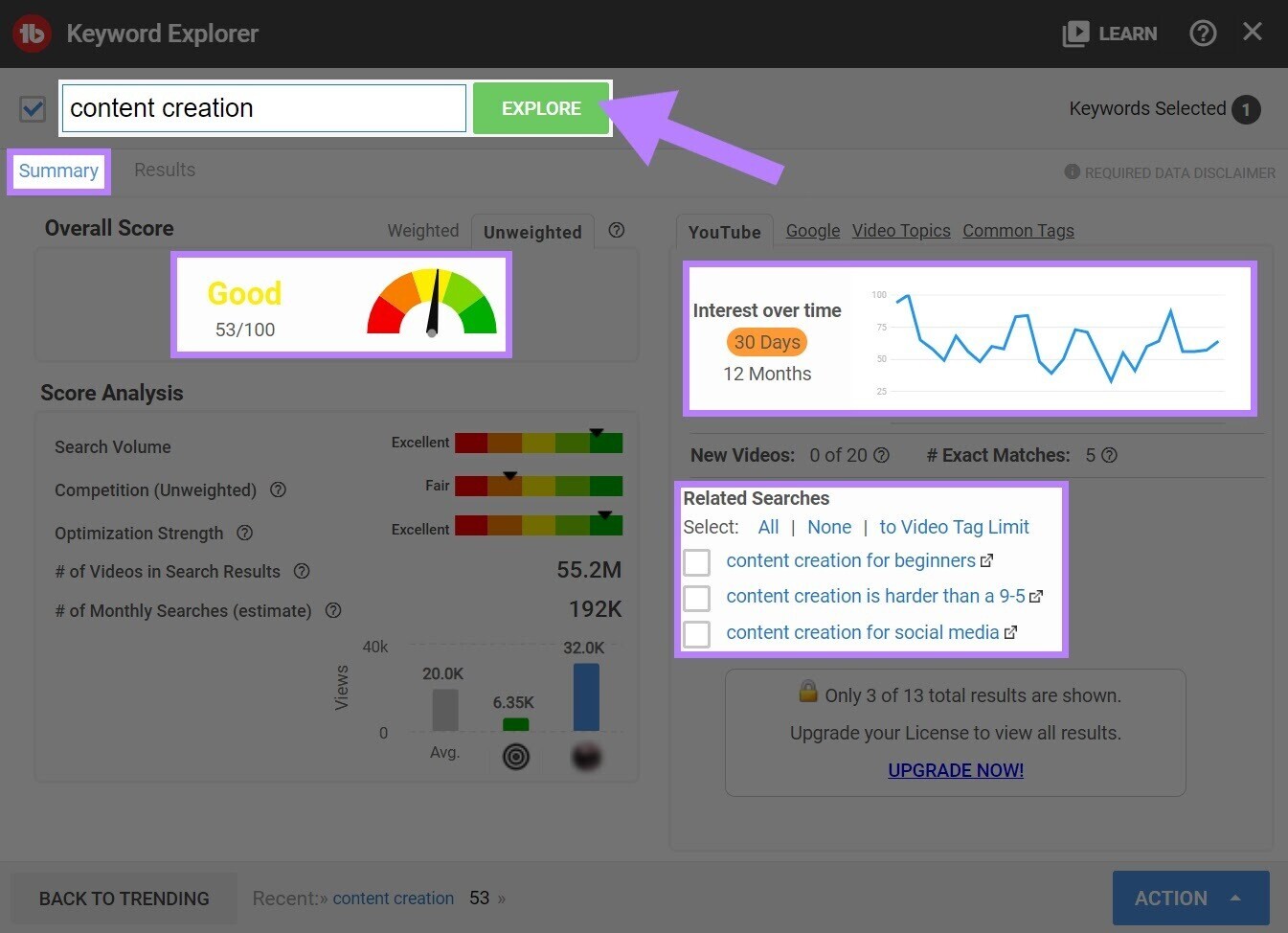
Click the “Results” tab for a snapshot of the current YouTube results for that keyword, including the top-ranking videos and channels.
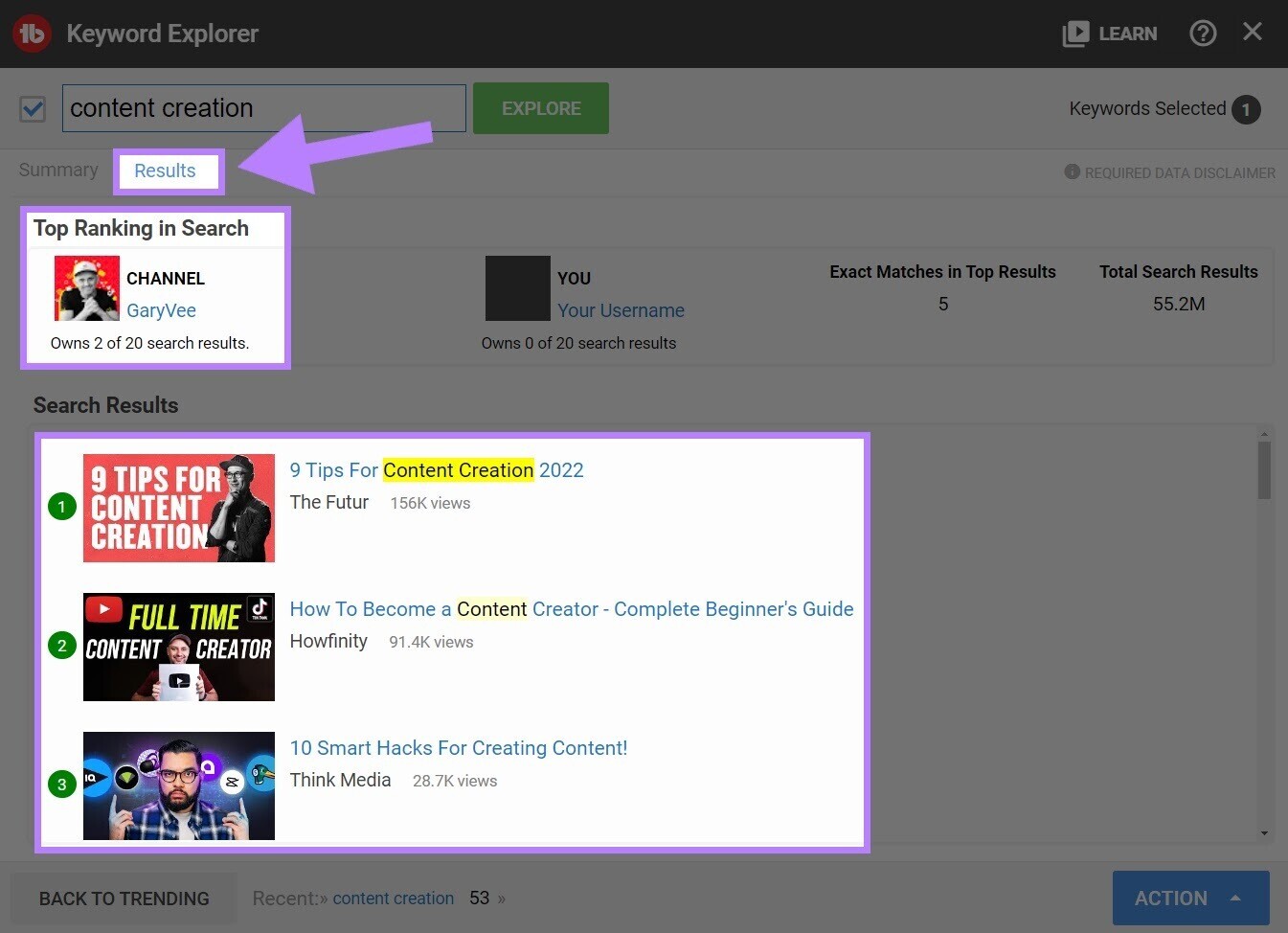
You can use this information for competitive research.
If you click through to watch one of those videos, you’ll find a “Videolytics” panel. It shows performance data, SEO, best practices, and even video tags:
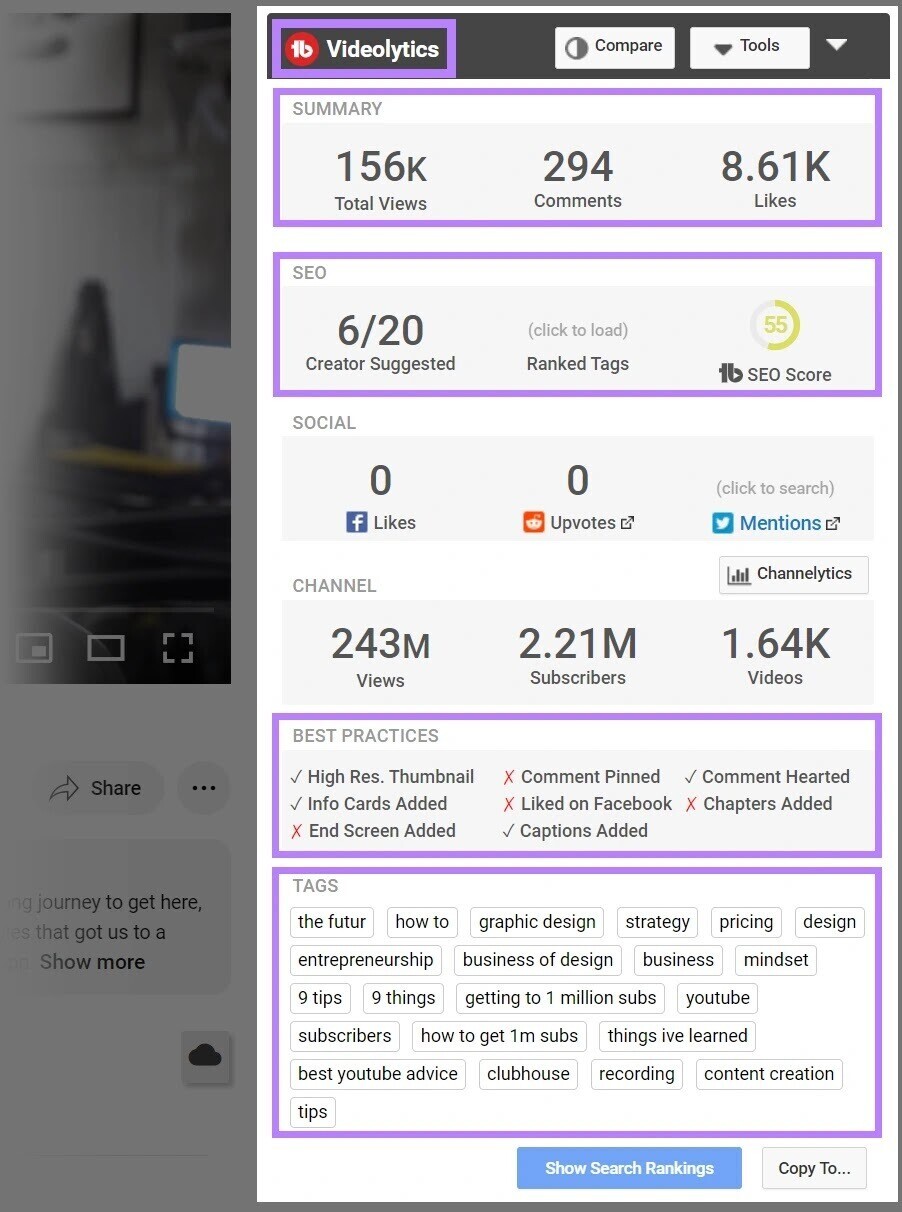
Pricing: With a free account, you can perform 25 searches in Keyword Explorer per day.
There are multiple paid tiers (including an enterprise option), but the most popular is the “Legend” account for $29.99 per month paid monthly or $23.99 per month paid annually. Which gives you unlimited access.
12. Rank Tracker for YouTube
Rank Tracker for YouTube is an app that tracks your YouTube channel rankings and target keyword search volume so you can improve your videos' performance. You can also track competitor’s channels to see what’s working for others.
To get started, copy/paste your YouTube channel URL in the YouTube Channel URL bar and click “Add Channel.”

Next, add your keywords. You can do this manually by adding one keyword per line and clicking “Import Keywords” or by importing a list of keywords from Semrush or your YouTube channel (if it is your own channel).

Once you import your keywords, you can review the average rank, keyword distribution, and rank changes for all your targeted keywords on a channel.
You can also pinpoint which targeted keywords yield the highest performance (under “Keyword”) and which content performs best for that keyword (by clicking “Preview”).

Pricing: Rank Tracker for YouTube is subscription-based and costs $19/month in addition to your Semrush account (after a free trial). This includes tracking for unlimited YouTube channels and up to 200 keywords.
You can add additional keywords for:
+ 100 keywords $10/month
+ 200 keywords $19/month
+ 500 keywords $44/month
+ 1000 keywords $79/month
You can find more information on Semrush subscriptions here.
13. Keyword Tool
Keyword Tool uses autocomplete data from various search engines and sites—including Google, Bing, YouTube, Amazon, Instagram, eBay, and Play Store—to help you find keyword ideas and popular hashtags.

First, select the search engine and country you want to view data for. Then, enter your seed keyword and hit the search icon.
The tool will generate a list of autocomplete suggestions, questions, and prepositions from your selected source (which is Google in the example below).
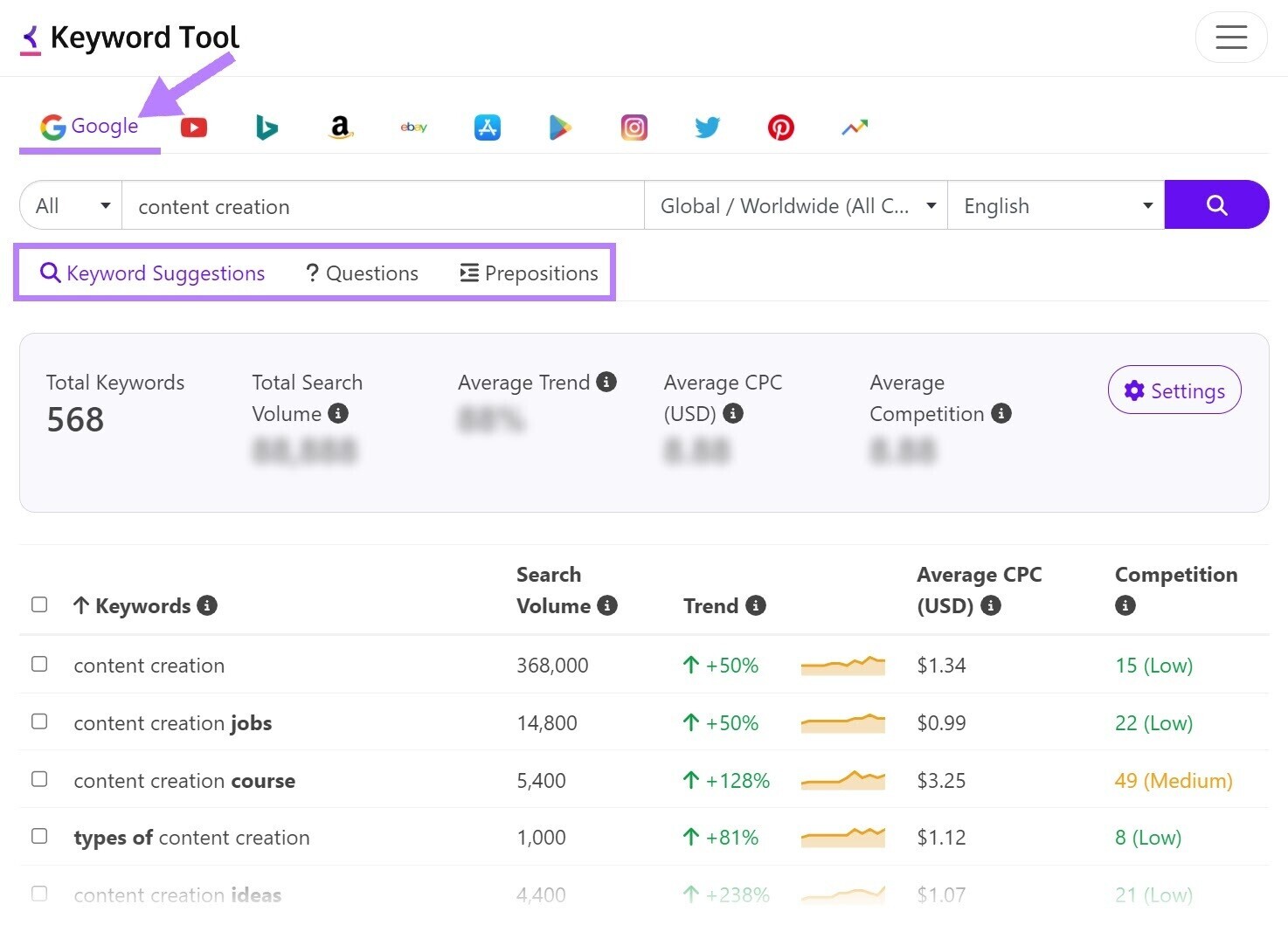
Select all the keywords you want to target and click the export icon to download them as a CSV or Excel file.
Pricing: You can use the free version of Keyword Tool without even creating an account. The free tool generates up to 750 suggestions for each seed keyword searched.
But you don’t get valuable keyword metrics like search volume and keyword competition with a free account.
So, you can consider subscribing to a “Pro Basic” plan at $69 per month billed annually or $89 per month billed monthly to unlock these metrics.
14. Ecommerce Keyword Analytics
Ecommerce Keyword Analytics is a keyword research app that offers information about the keywords that are searched on leading retailers’ domains, like amazon.com and target.com.
With this app, you can review the top-performing retail keywords based on estimated number of orders, conversion rate, and more.
If you find a keyword with a high conversion rate, you can presume it comes with purchasing intent which could be valuable for your campaign, too.
To use Ecommerce Keyword Analytics, choose your country, enter your keyword, and click “Search.”

From here, you can review numerous metrics related to your business’s keywords under two different main tabs: Retail Keywords and Top Keywords.
Under the Retail Keywords tab, you can run an analysis of up to four keywords across multiple domains.

You can also review related keywords and the top online retailers for each of your designated keywords in the tables below the graph.

In the Top Keywords section, you can review a breakdown of the performance of an individual keyword across numerous online retailer domains.

Pricing: If you want to check this app out first, there is a free 7-day trial for Semrush users.
After the free trial, Ecommerce Keyword Analytics runs $19.99 monthly in addition to the existing Semrush account.
15. Keyword Analytics for YouTube
Keyword Analytics for YouTube uses keyword insights to discover user trends on YouTube so that you can target words that bring your videos more viewers.
Say you want to post an iPhone 15 product review video to your YouTube channel but don’t know what keywords to use to obtain traffic.
Simply type your topic into the search bar and click “Search.” On the left, you’ll see the list of top keywords, their search volume, and the competitive rate.

On the right, you’ll see the metrics for the keyword selected, a box that displays keywords related to your specified keyword, and the top videos trending for the chosen keyword.

Once you’ve determined the data you want to focus on, you can export this information to a PDF.
Pricing: Keyword Analytics for YouTube is an app in the Semrush App Center. The app is priced at $10 monthly for users in addition to a Semrush subscription.
16. Google Keyword Planner
Google Keyword Planner is a Google keyword research tool.
Although it’s primarily meant for advertisers who invest in pay-per-click (PPC) advertising with Google Ads, you can also use it to find keywords for SEO.
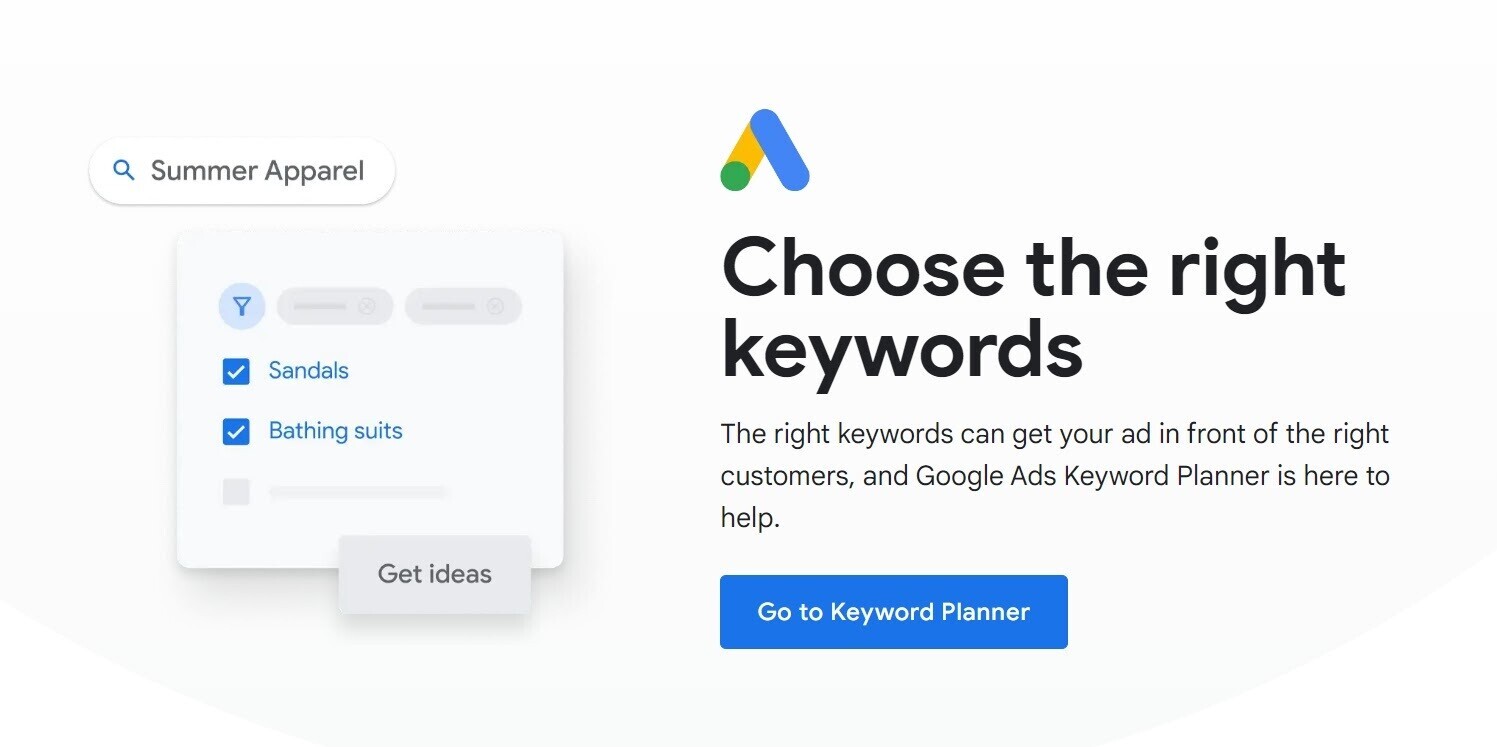
To access Keyword Planner, you’ll need a Google Ads account. If you’re not sure how to set that up, follow the instructions in our blog post on using Google Keyword Planner.
You can use Keyword Planner to do two things:
- Find new keywords
- Find historical data about keywords
To find new keywords, click “Discover new keywords.” Then enter your seed keyword and click “Get results.”
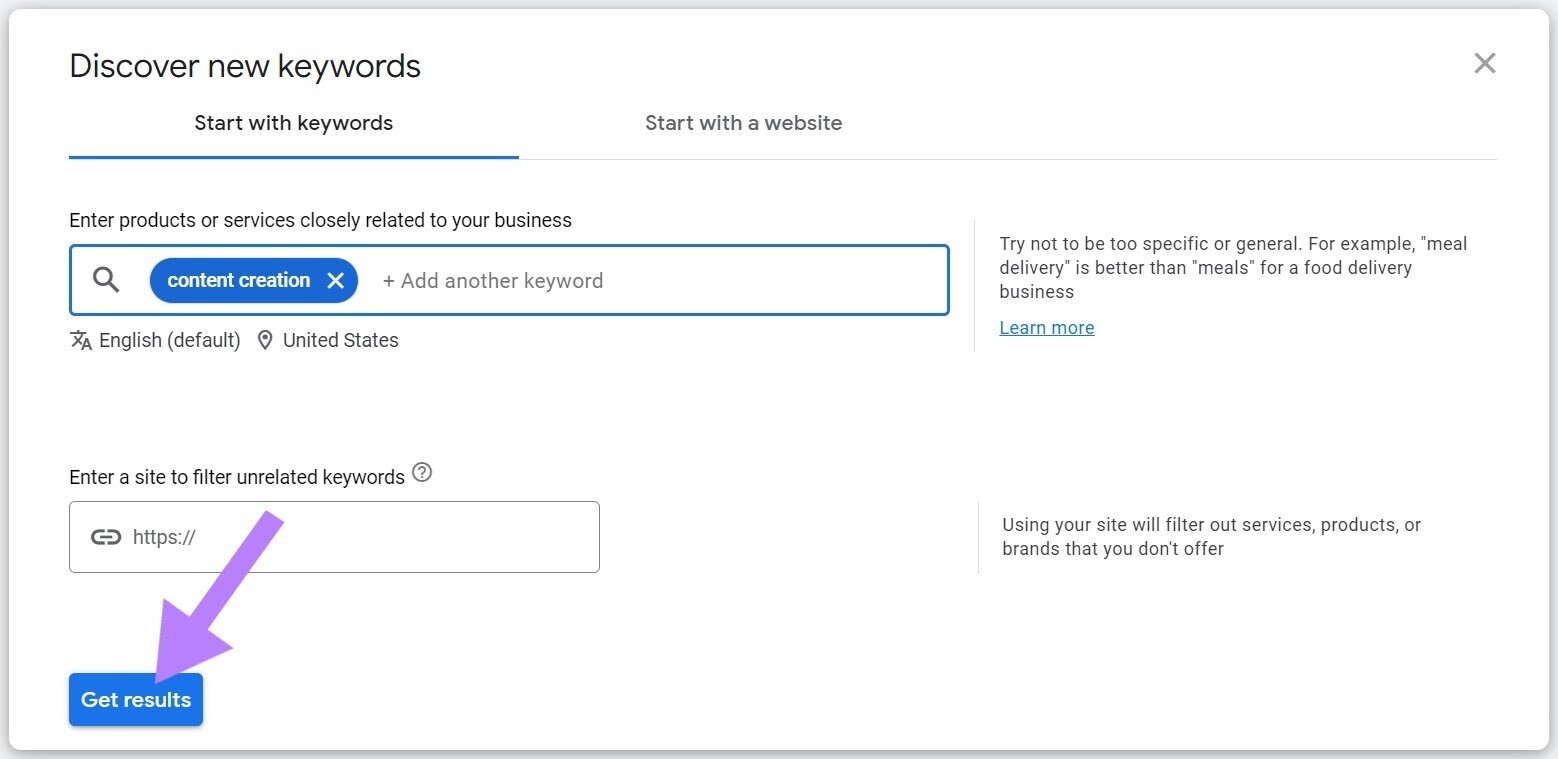
You’ll see a bunch of keyword ideas in seconds.
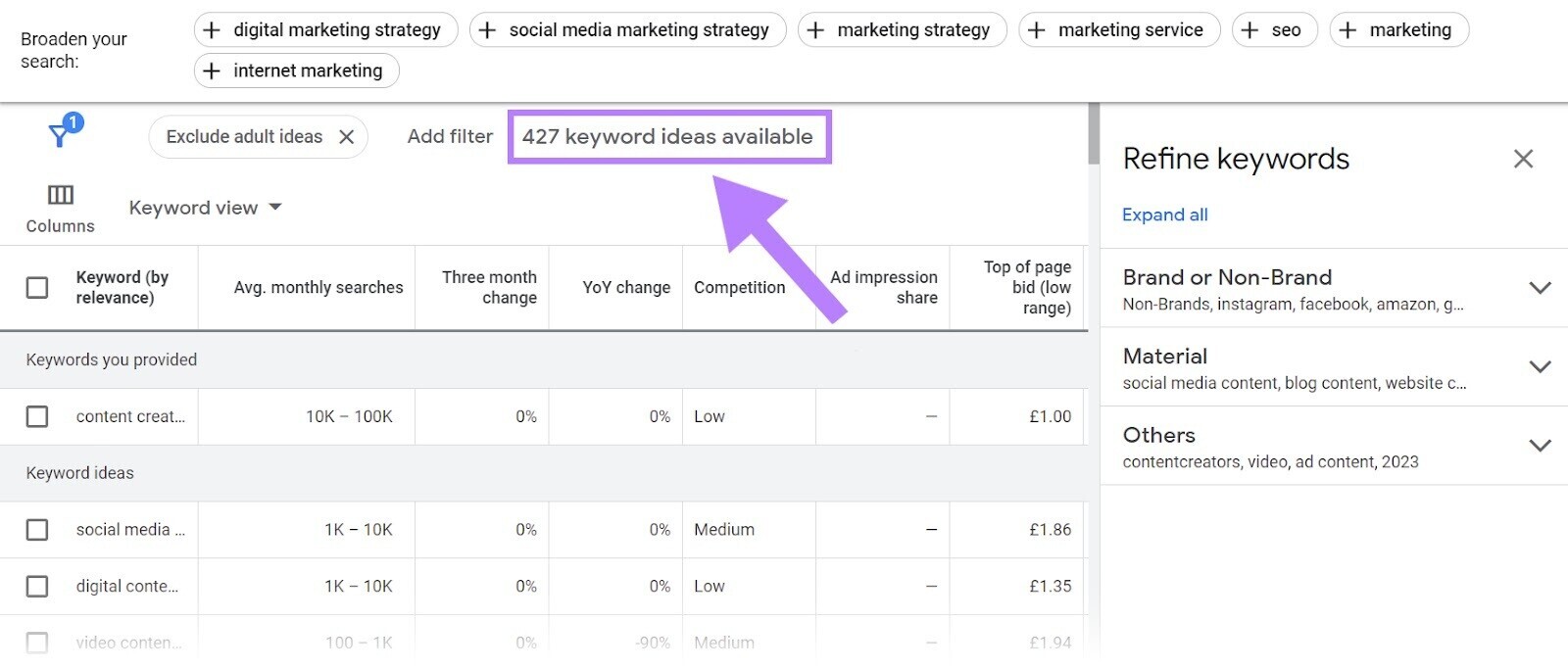
To find monthly search volume data for a list of keywords, click “Get search volume and forecasts.” Then, you can type, copy and paste, or upload your list of keywords. And click “Get started.”

Here, you’ll find historical data for your batch of keywords. You can use this tool to track keywords you’re already targeting.

Price: While Keyword Planner is technically free, you can only access it via a Google Ads account (which asks for billing information).
It’s best to access this tool using an account that spends money on Google Ads, as this can help you access better data.
17. Organic Traffic Insights
The Organic Traffic Insights tool shows all the keywords you currently rank for on Google. It also includes keyword data from Google Analytics and Google Search Console.
And allows you to retrieve keywords that were previously concealed under the “not provided” category in Google Analytics.
Start by setting up a project in the tool.
Once that’s complete, you’ll see a report with lots of data points:
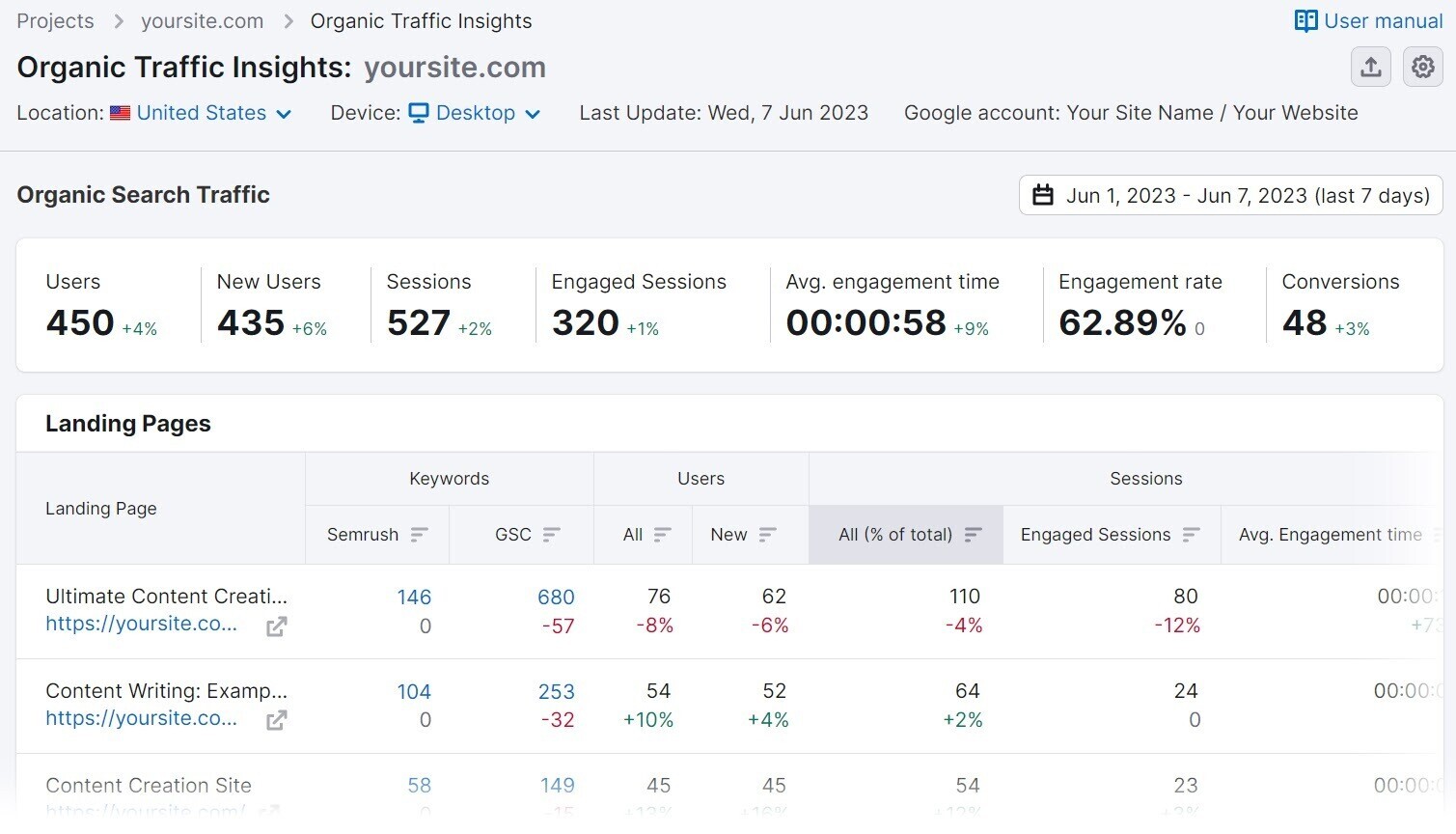
Go to the “Keywords” section of the report.
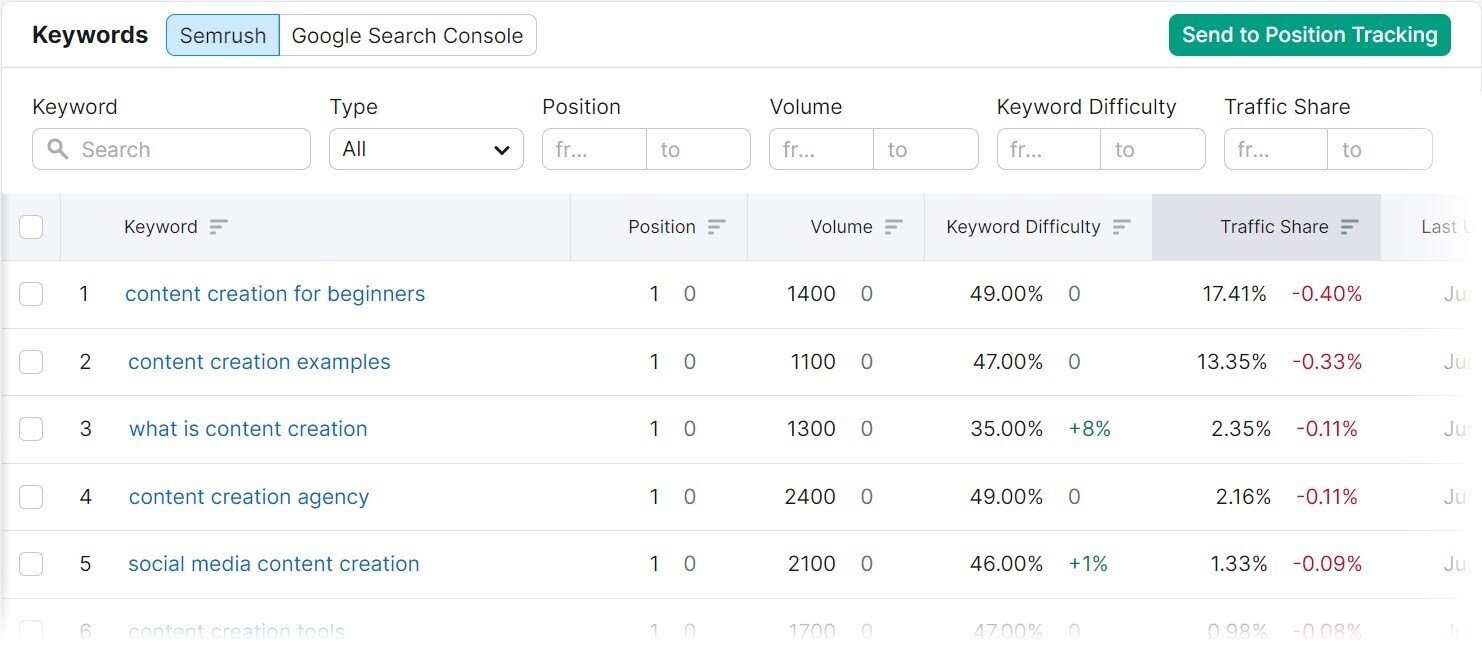
Now use this report to find your underperforming keywords. These are any keywords for which you rank in position 11 and beyond.
If you’re not ranking in the top 10, you’re practically invisible to search engine users. You won’t get much traffic.
So, it’s important to find your underperforming keywords and optimize for them.
To find underperforming keywords, set the position filter to only show keywords where you rank in page 11 and beyond.
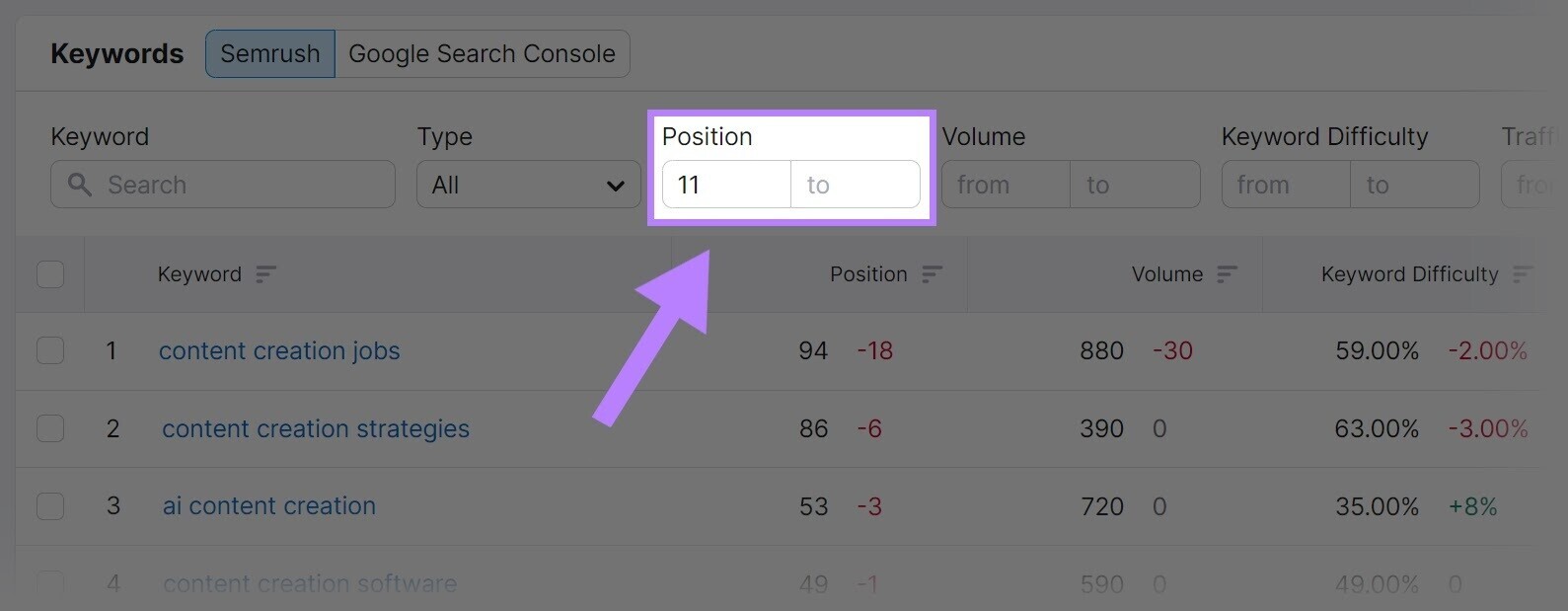
These are all the keywords for which your website doesn’t rank well.
So, consider optimizing for them to increase your ranking position and organic traffic.
Further reading: 6 optimization tips on how to optimize a page for keywords.
Pricing: Organic Traffic Insights comes as part of Semrush’s SEO toolkit. A free account gives you limited access to keyword data.
To unlock more data, subscribe to a paid plan for $108.33 per month billed annually or $129.95 per month billed monthly.
18. Soovle
Soovle is a free keyword research tool that aggregates search suggestions across multiple search engines and websites. Including Google, Bing, Wikipedia, Amazon, eBay, and YouTube.
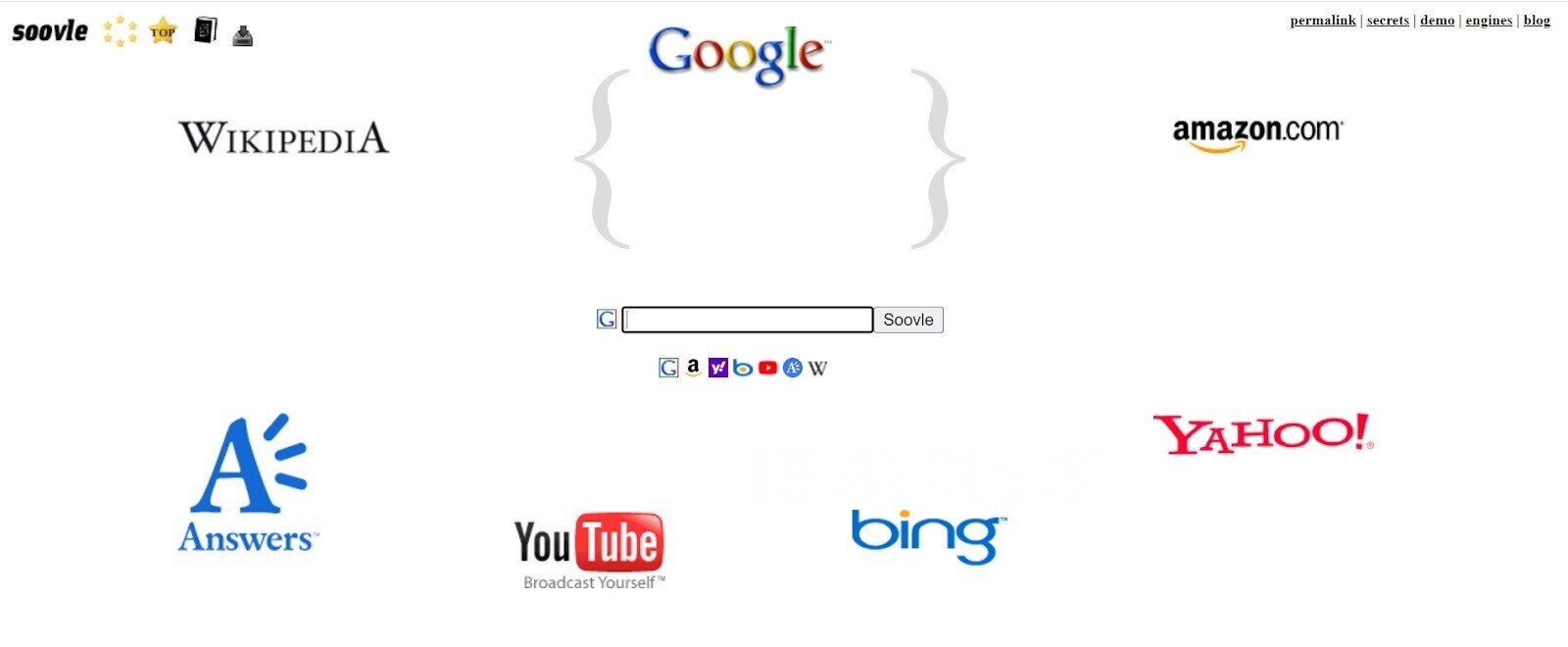
Use the search bar in the center of the screen to enter your seed keyword. The suggestions will automatically populate over their respective search engine logos.
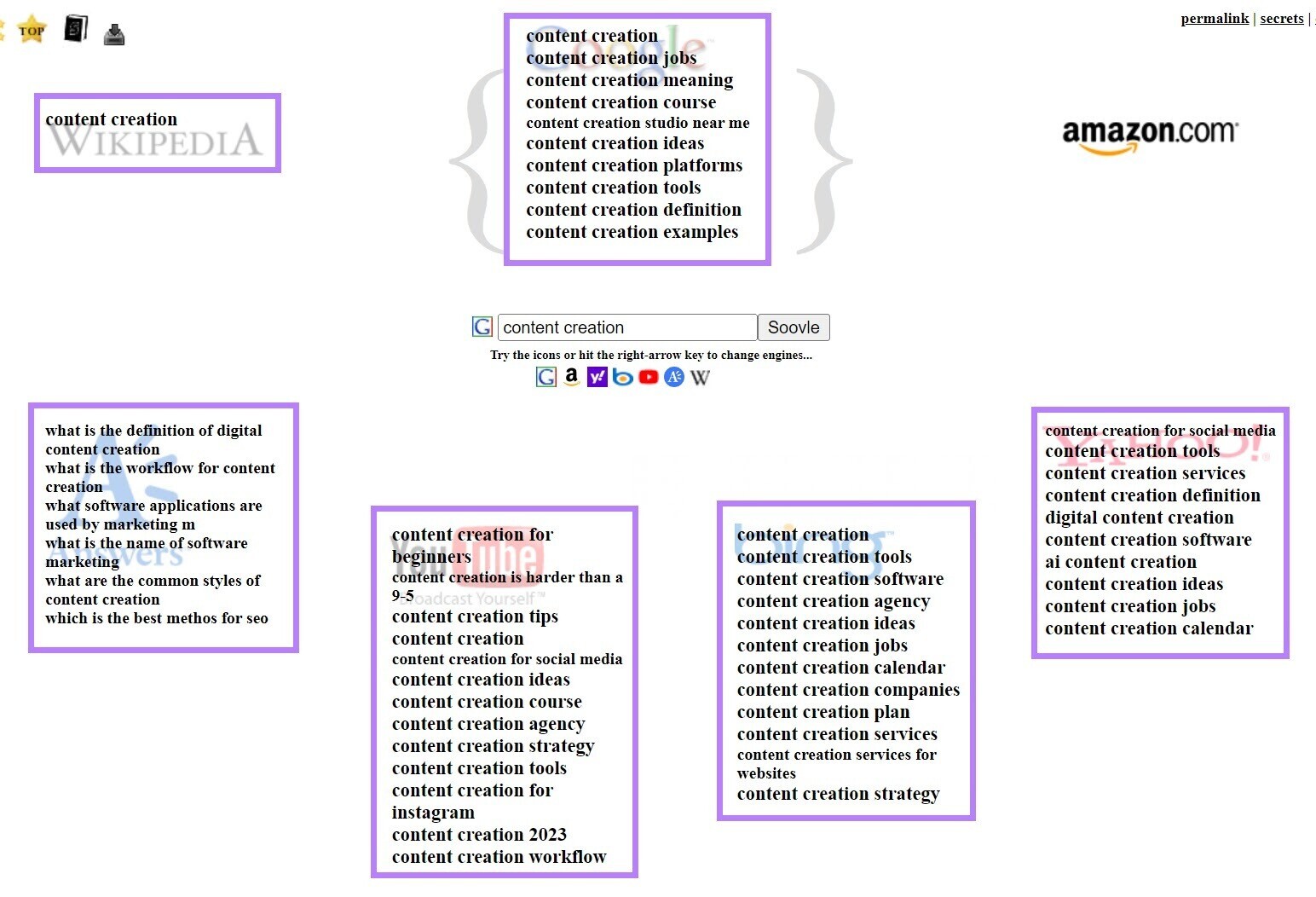
You can use your right arrow key to move through each search engine and click on any keyword to view its live search results page.
To save a keyword to reference later, drag it to the book icon in the top left corner.
Price: Soovle is free.
Try Free Keyword Research Tools with Semrush
Semrush has a suite of keyword research tools that help you find, analyze, and manage keywords for your website.
Want to test them out before committing to a paid plan?
No problem! You can sign up for a free trial.
And if you want to learn more about keyword research in general, here’s what you should read next:
